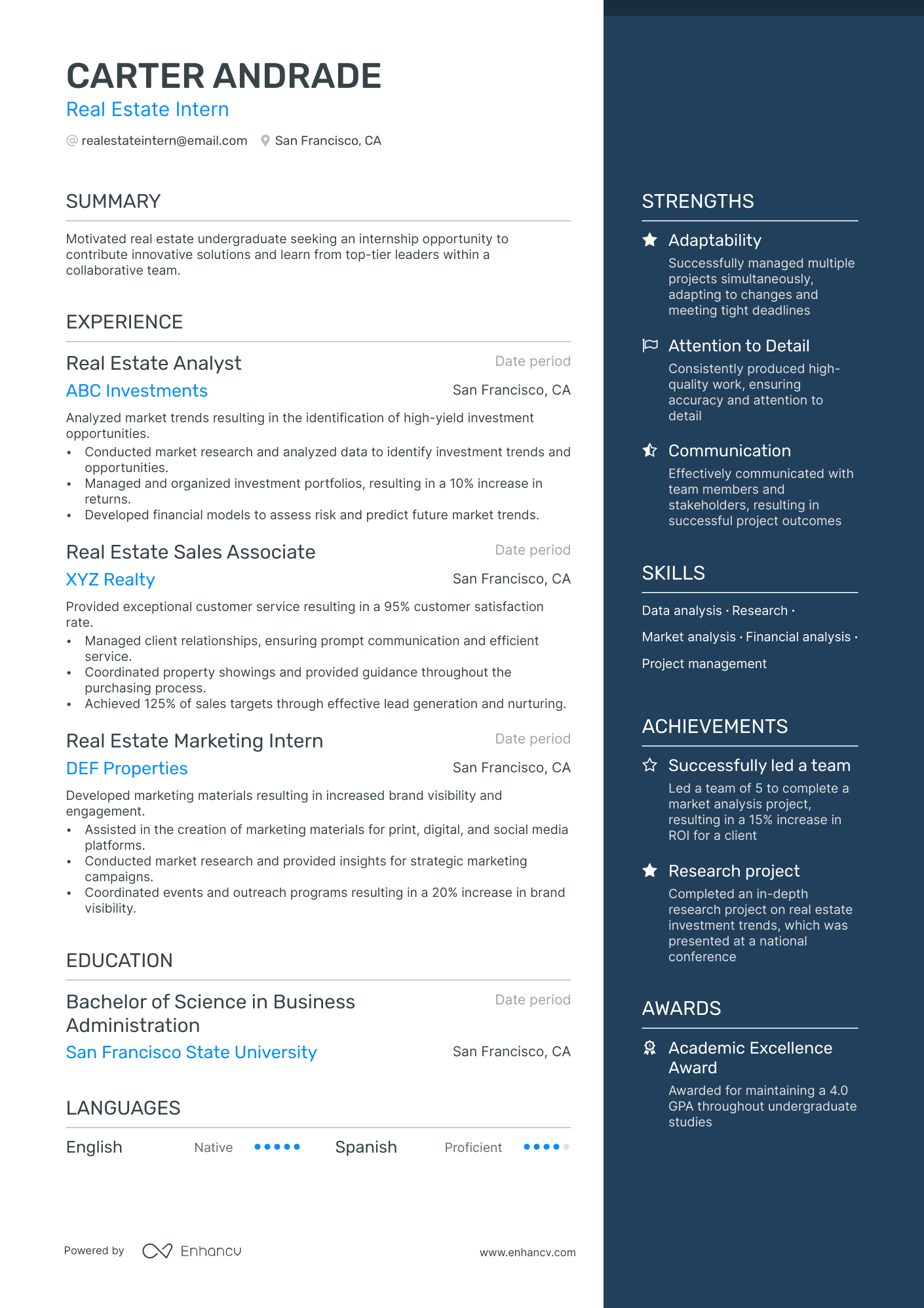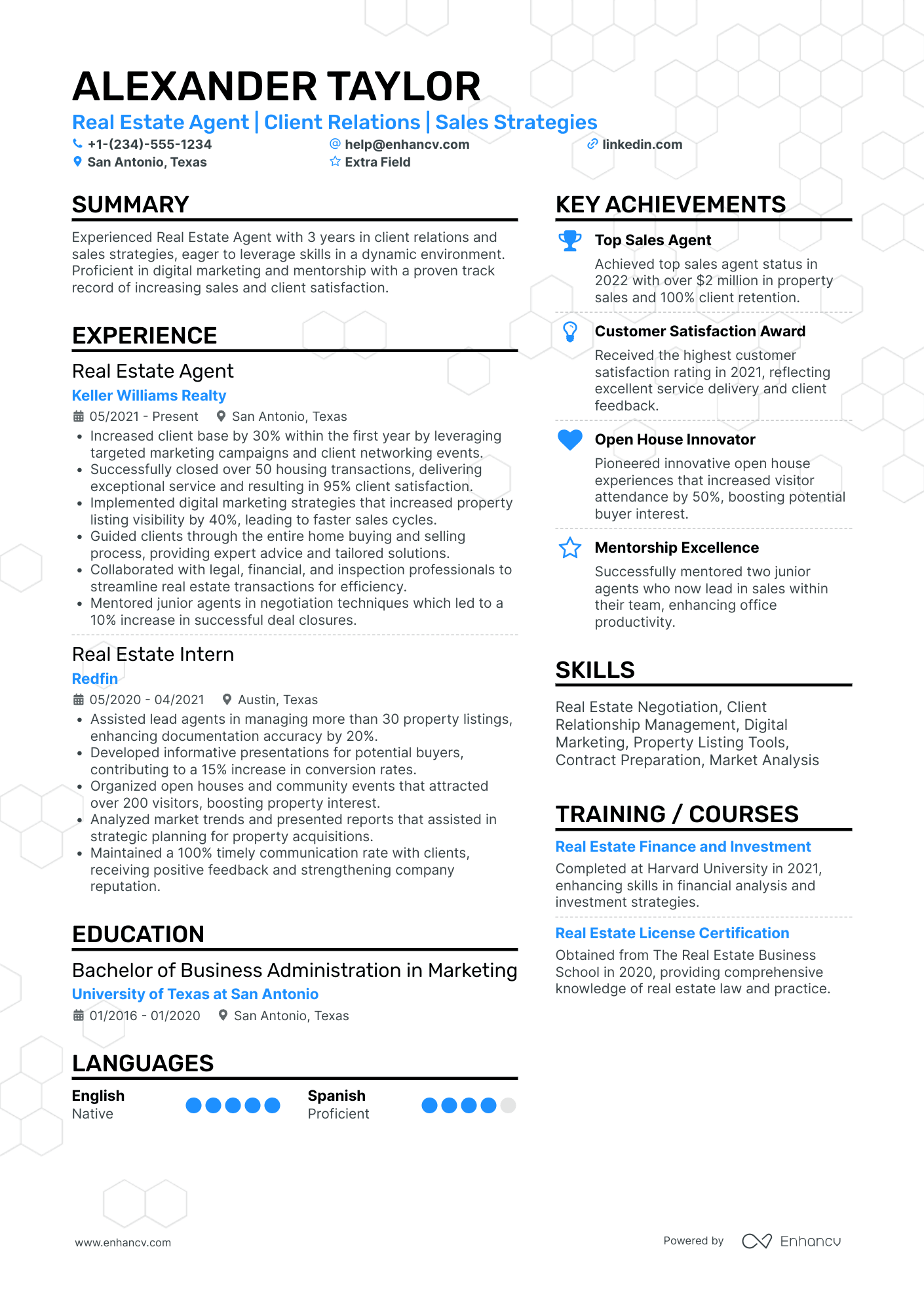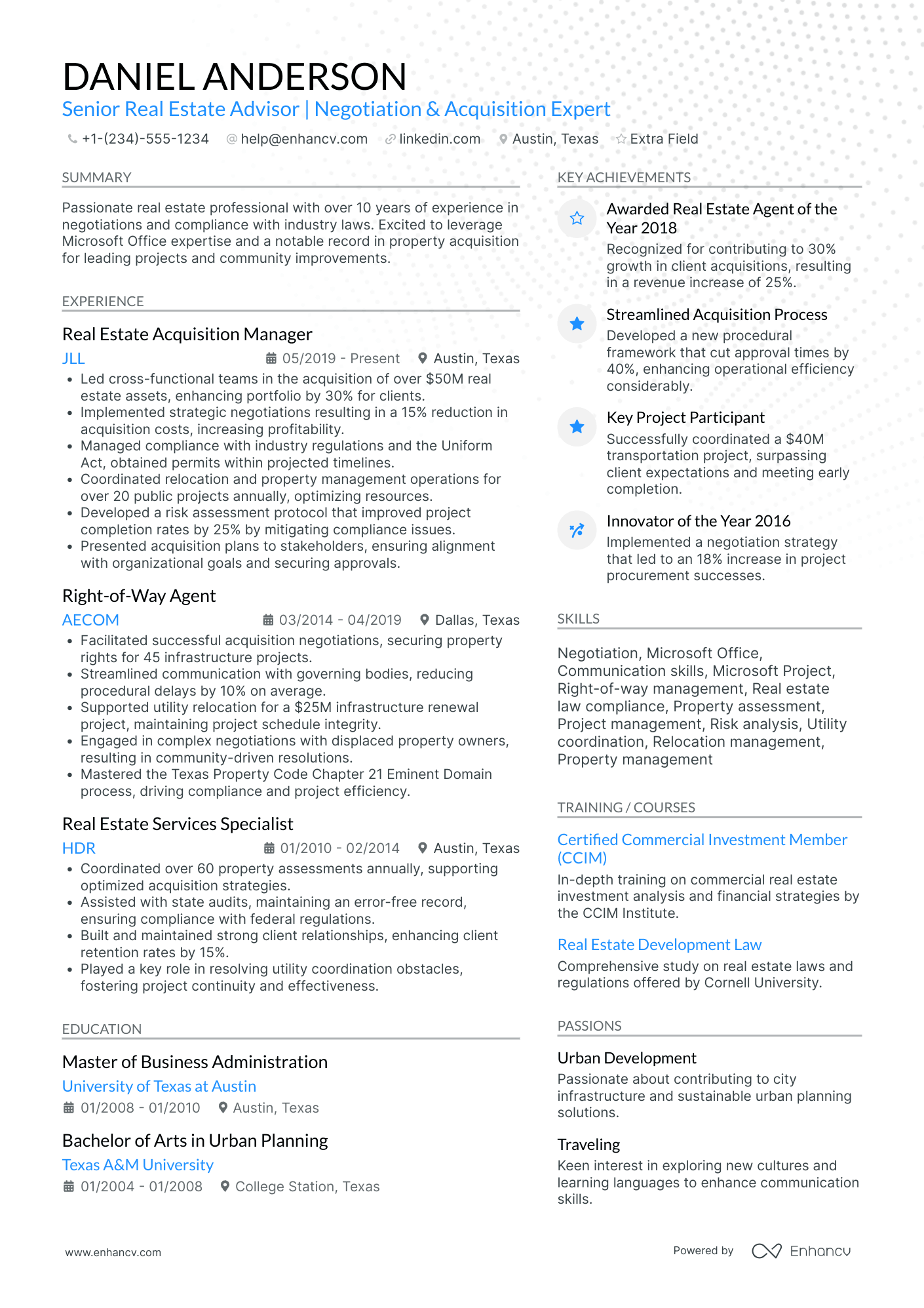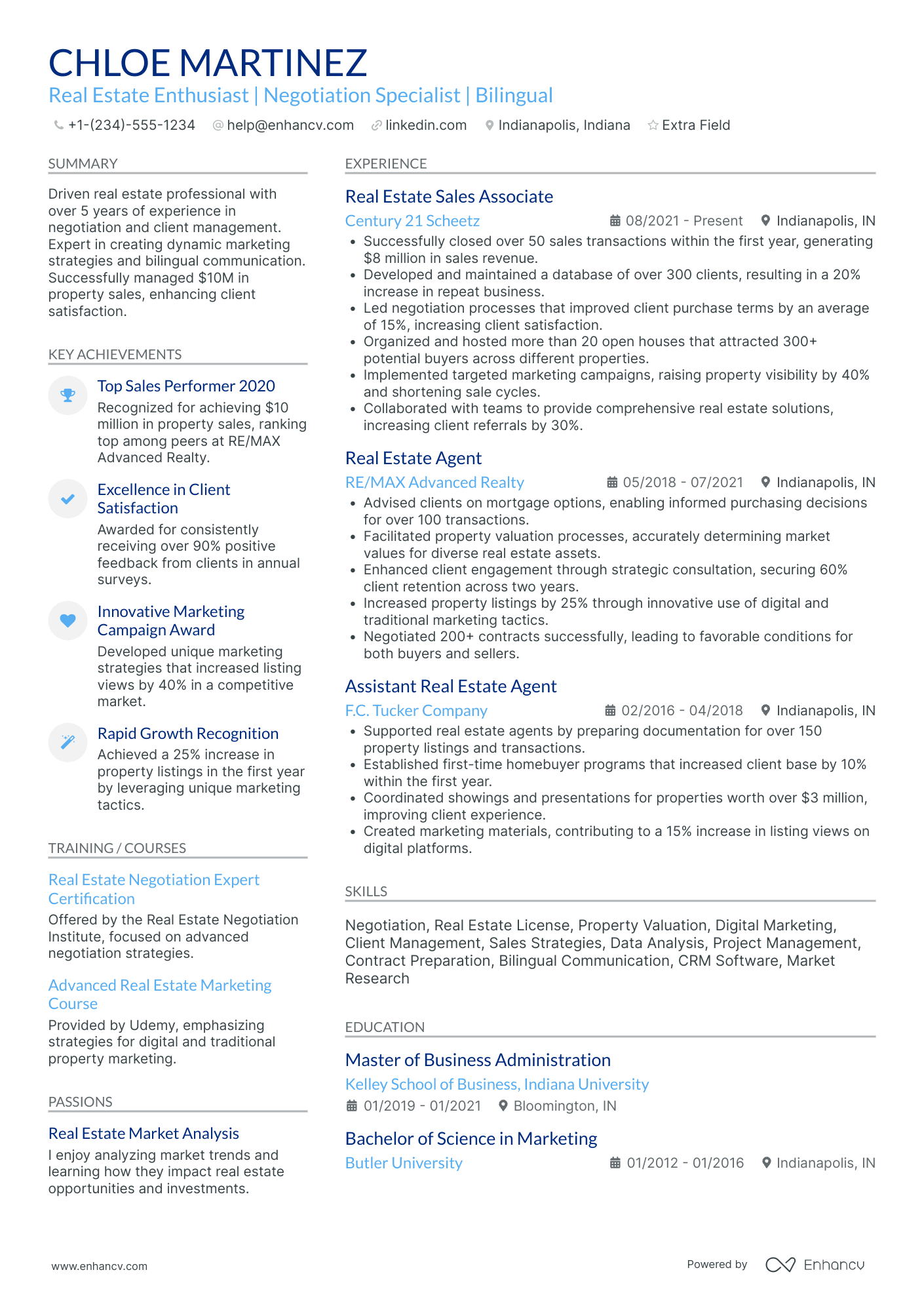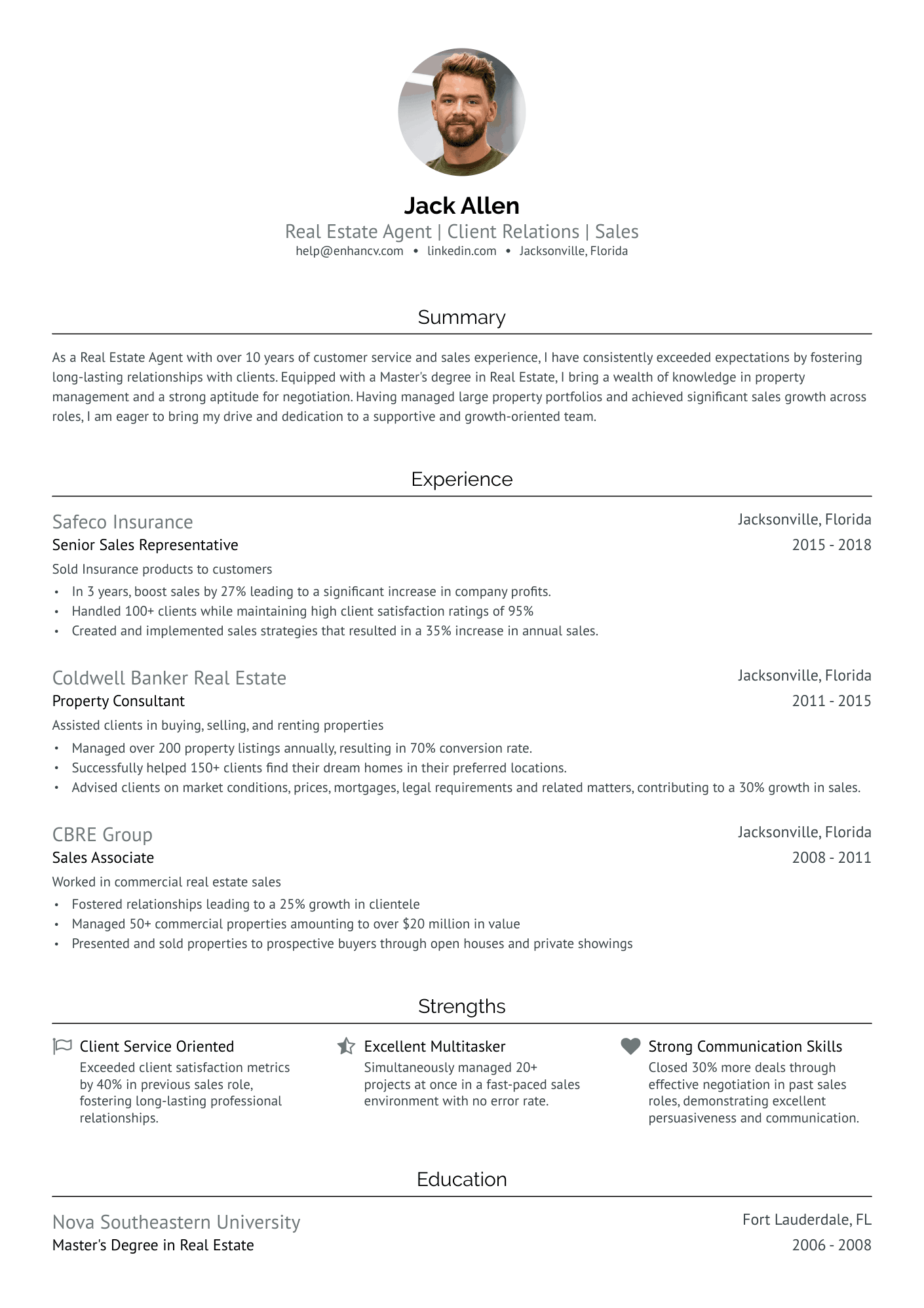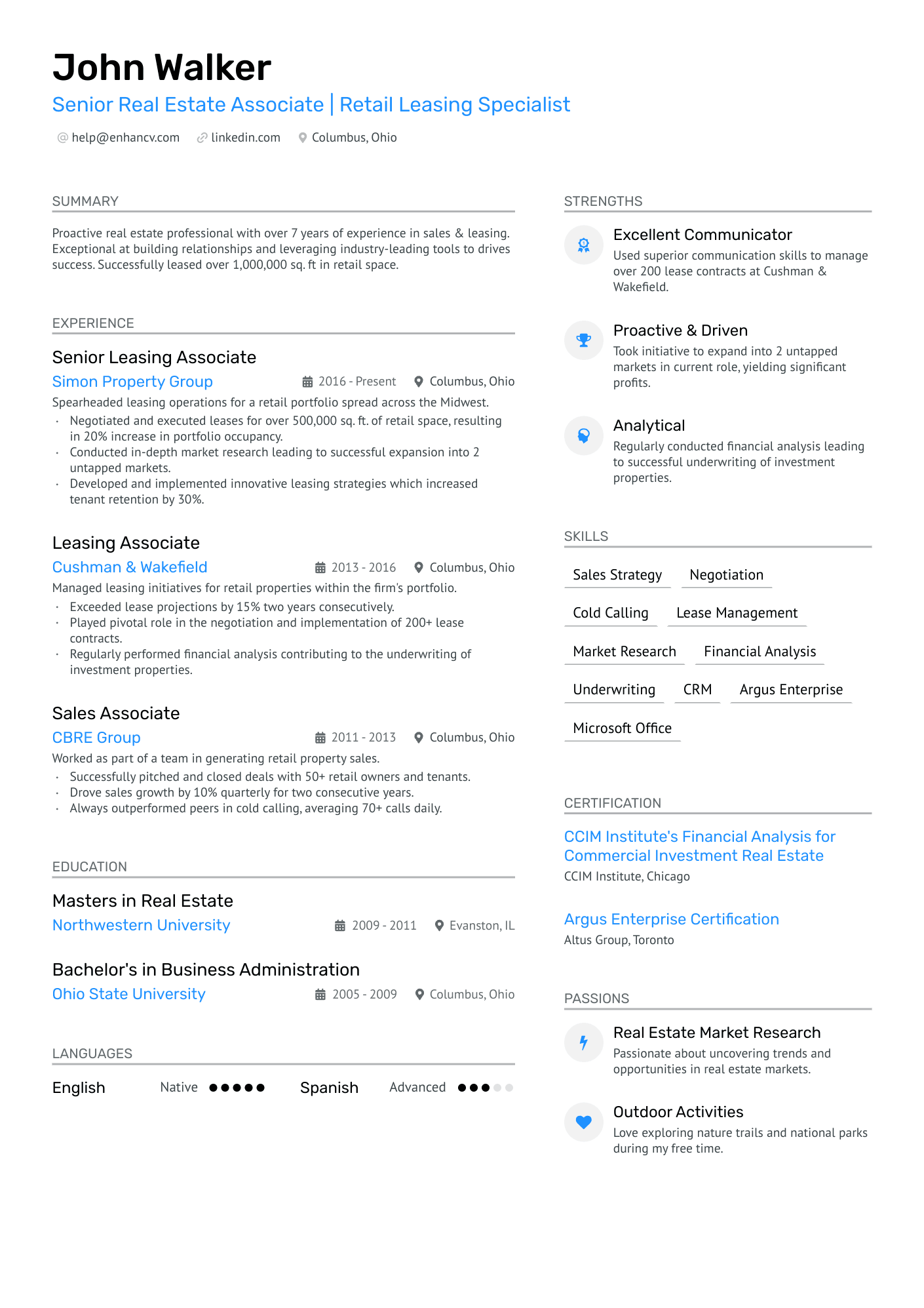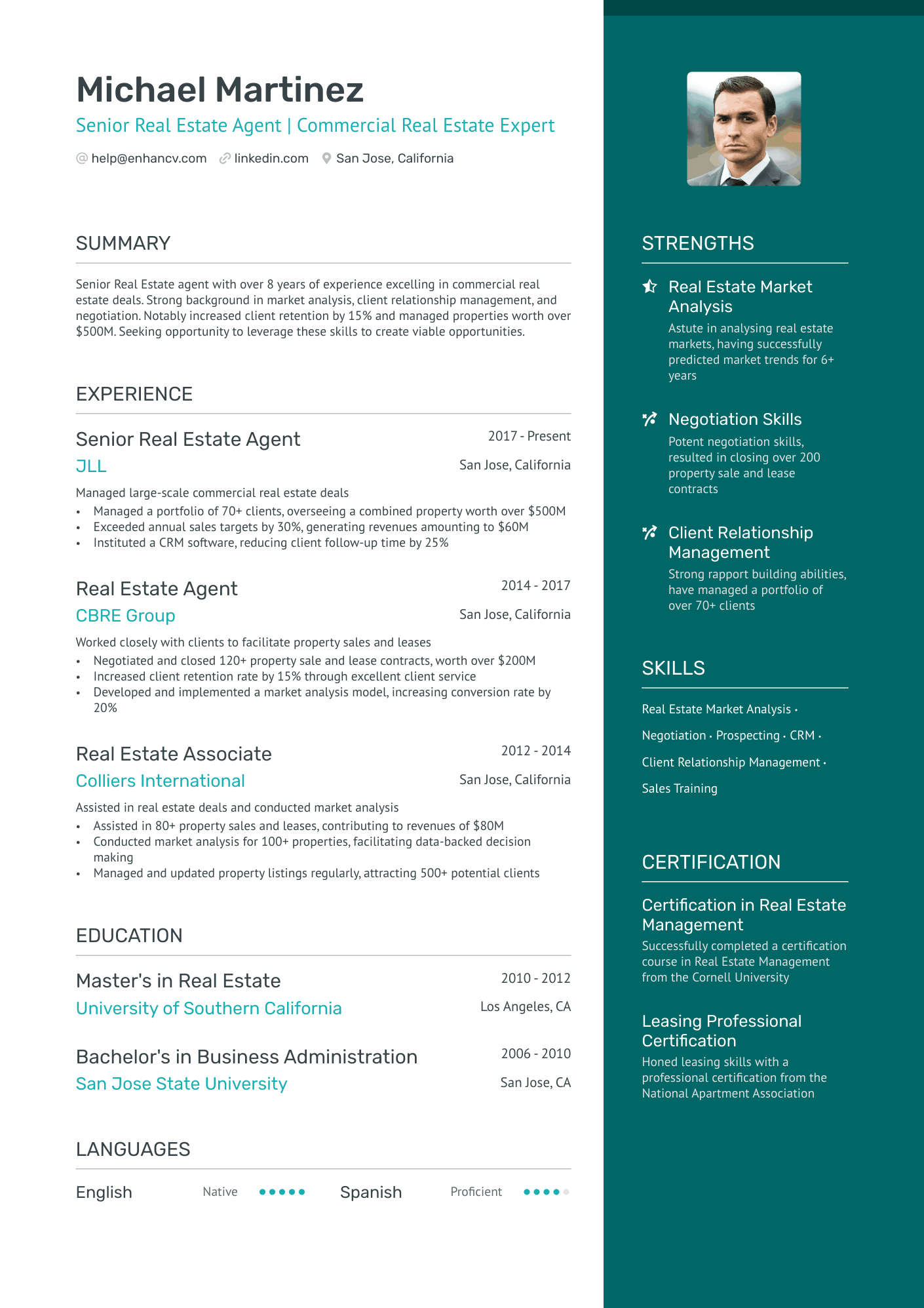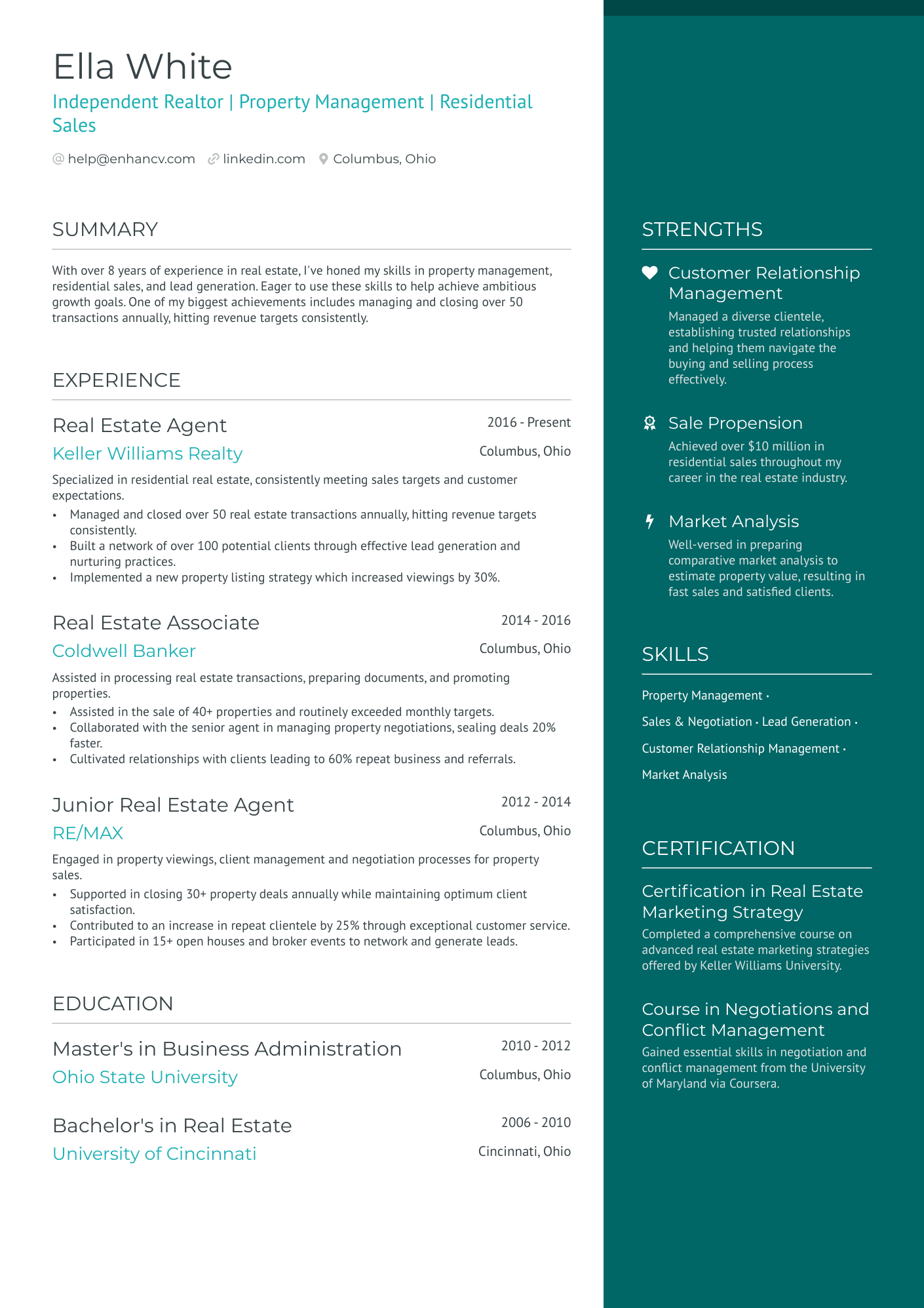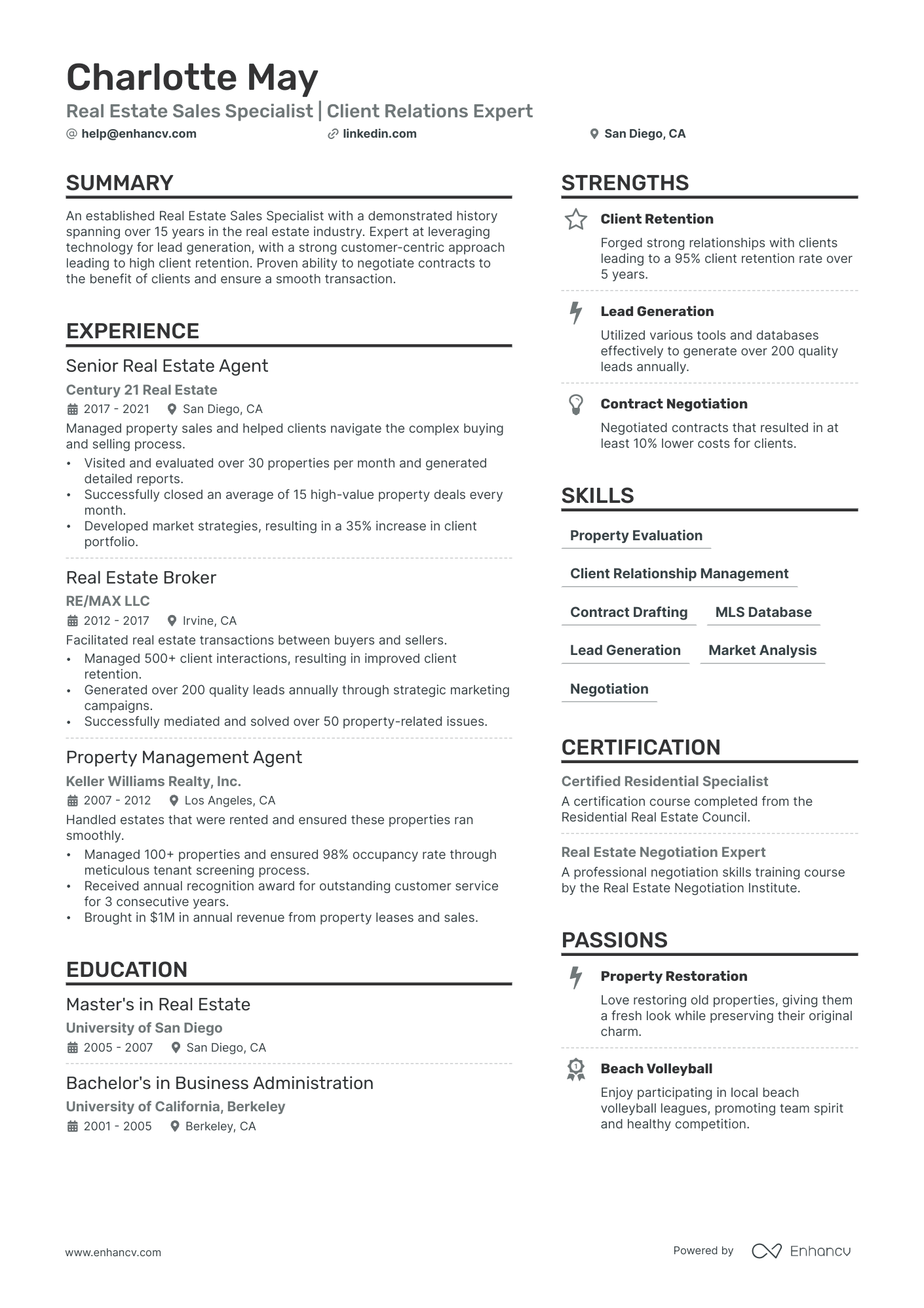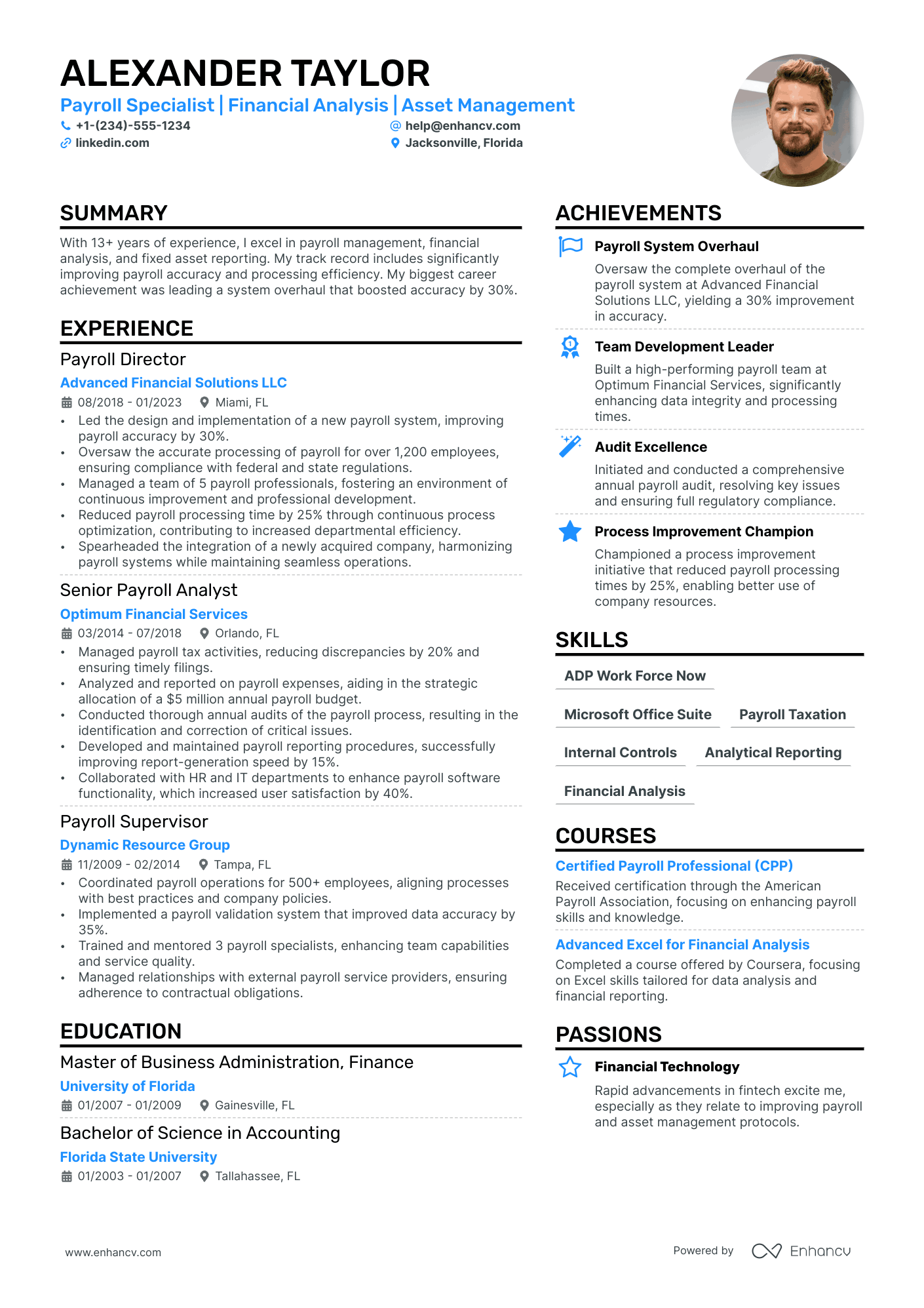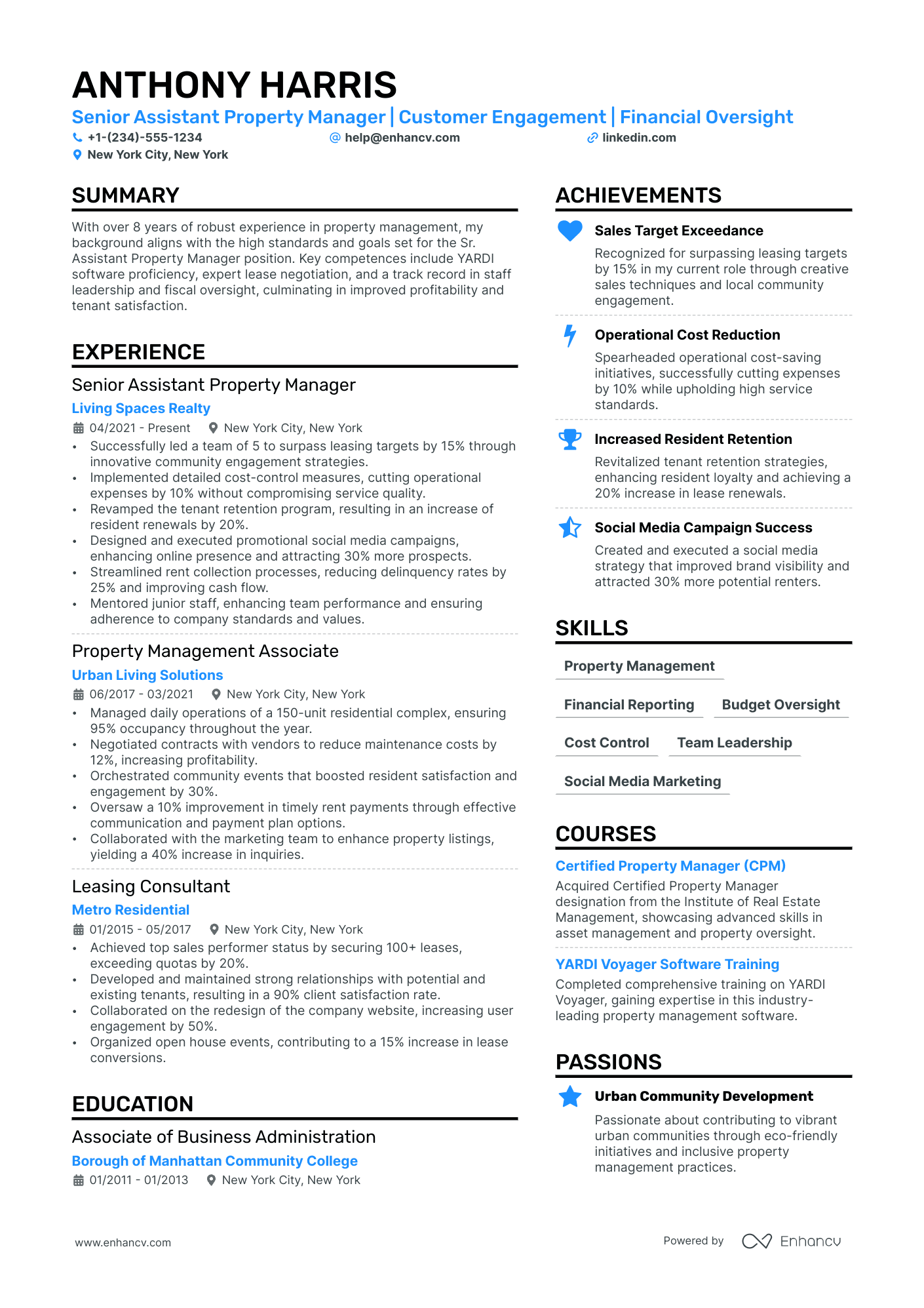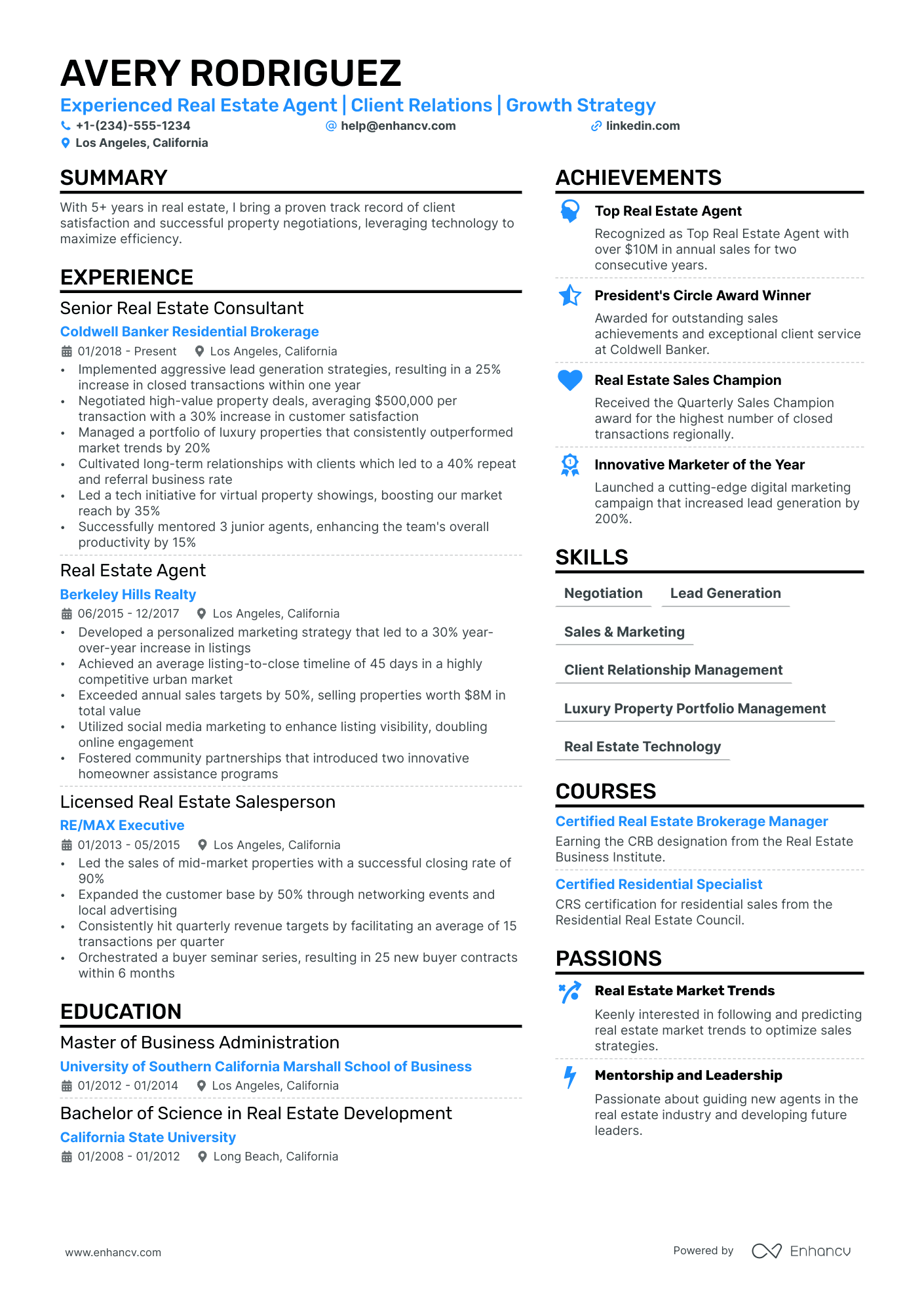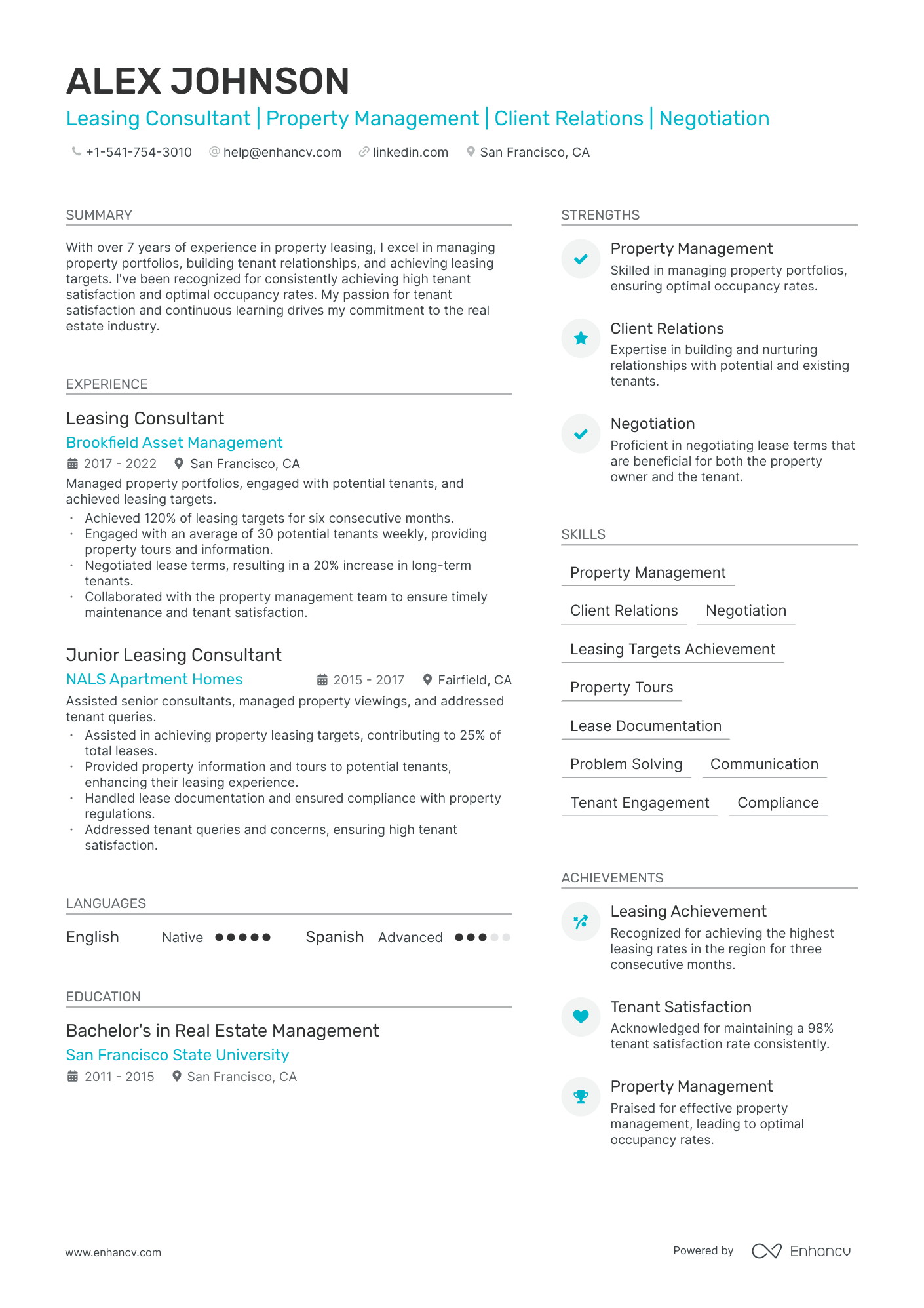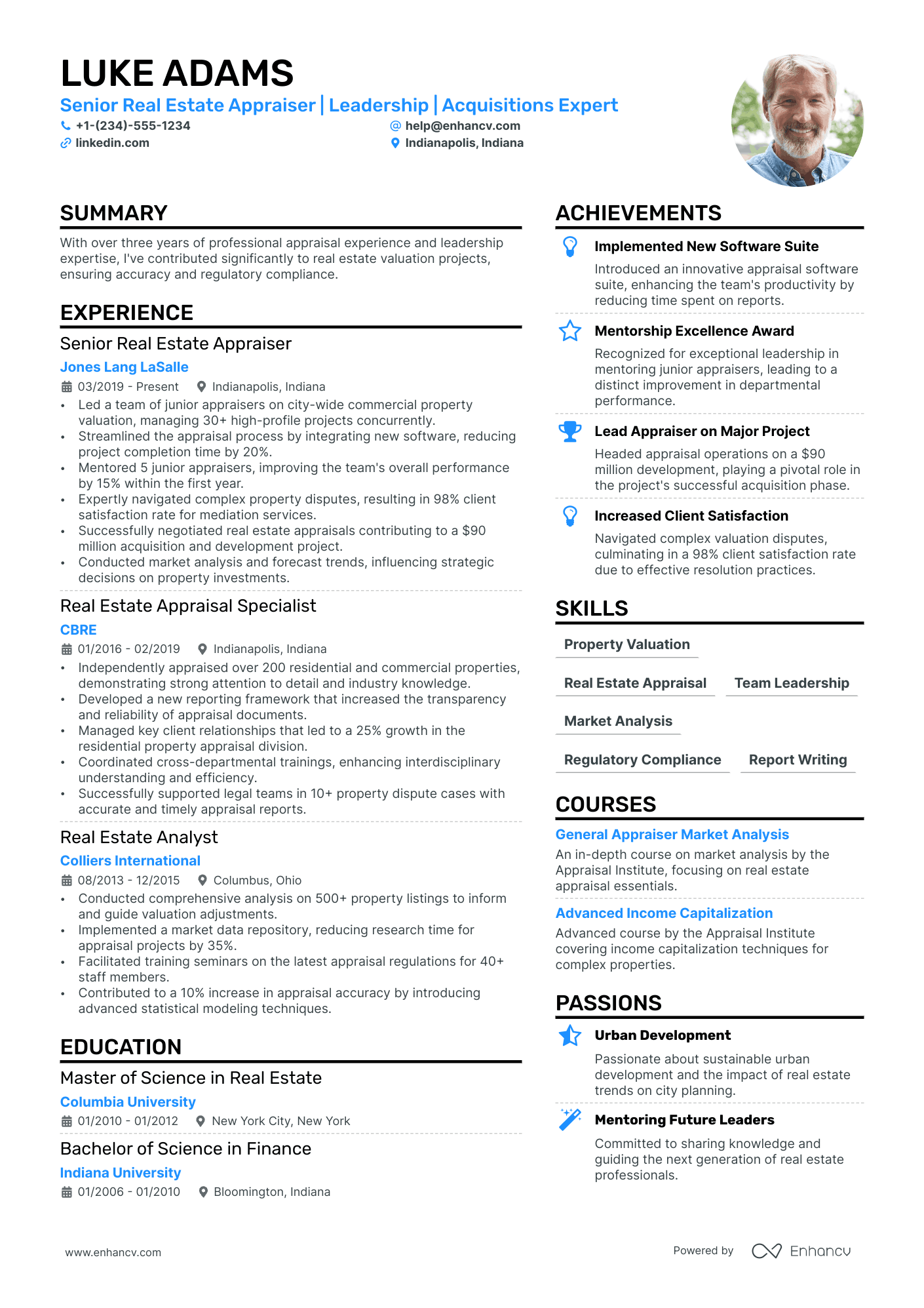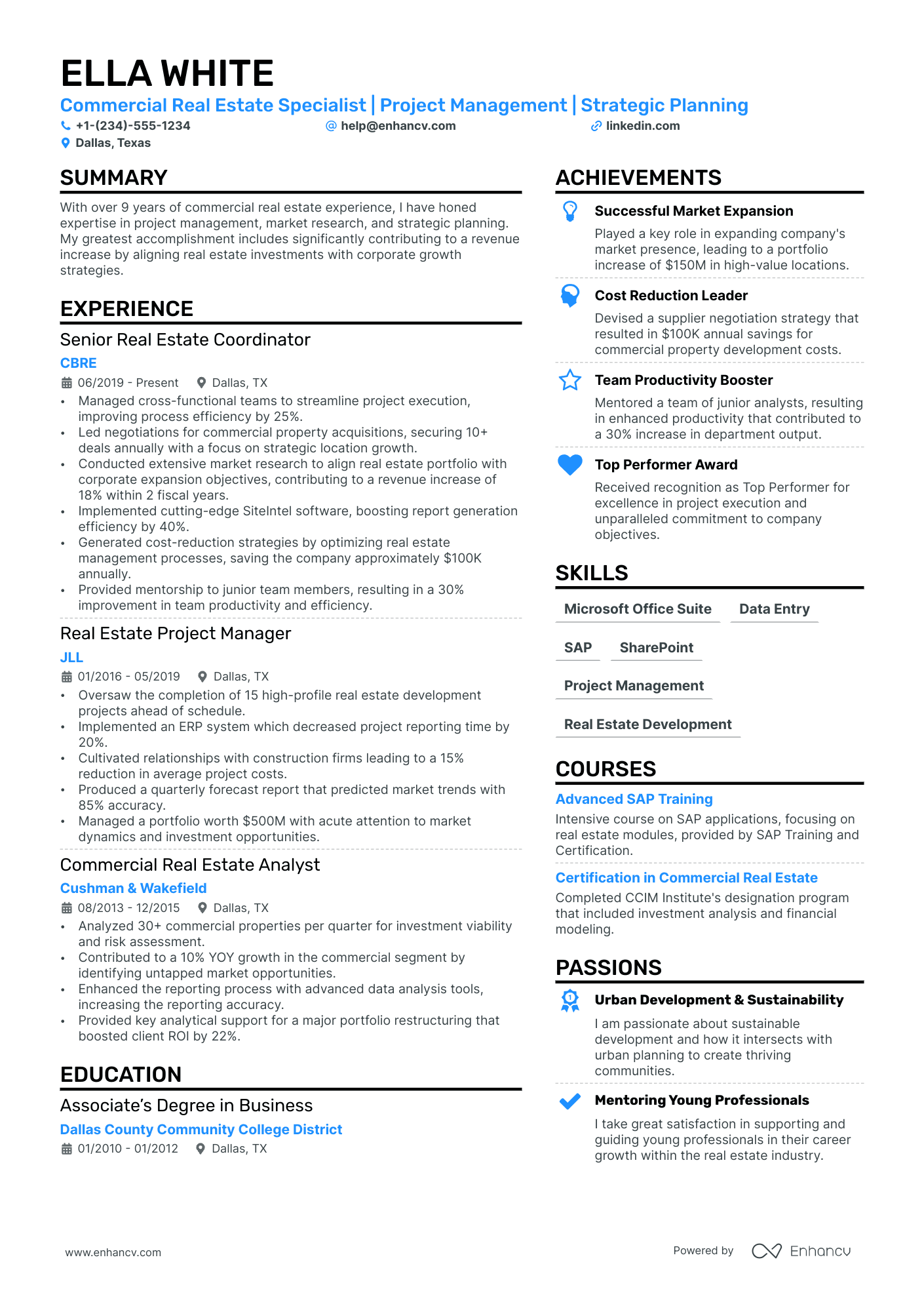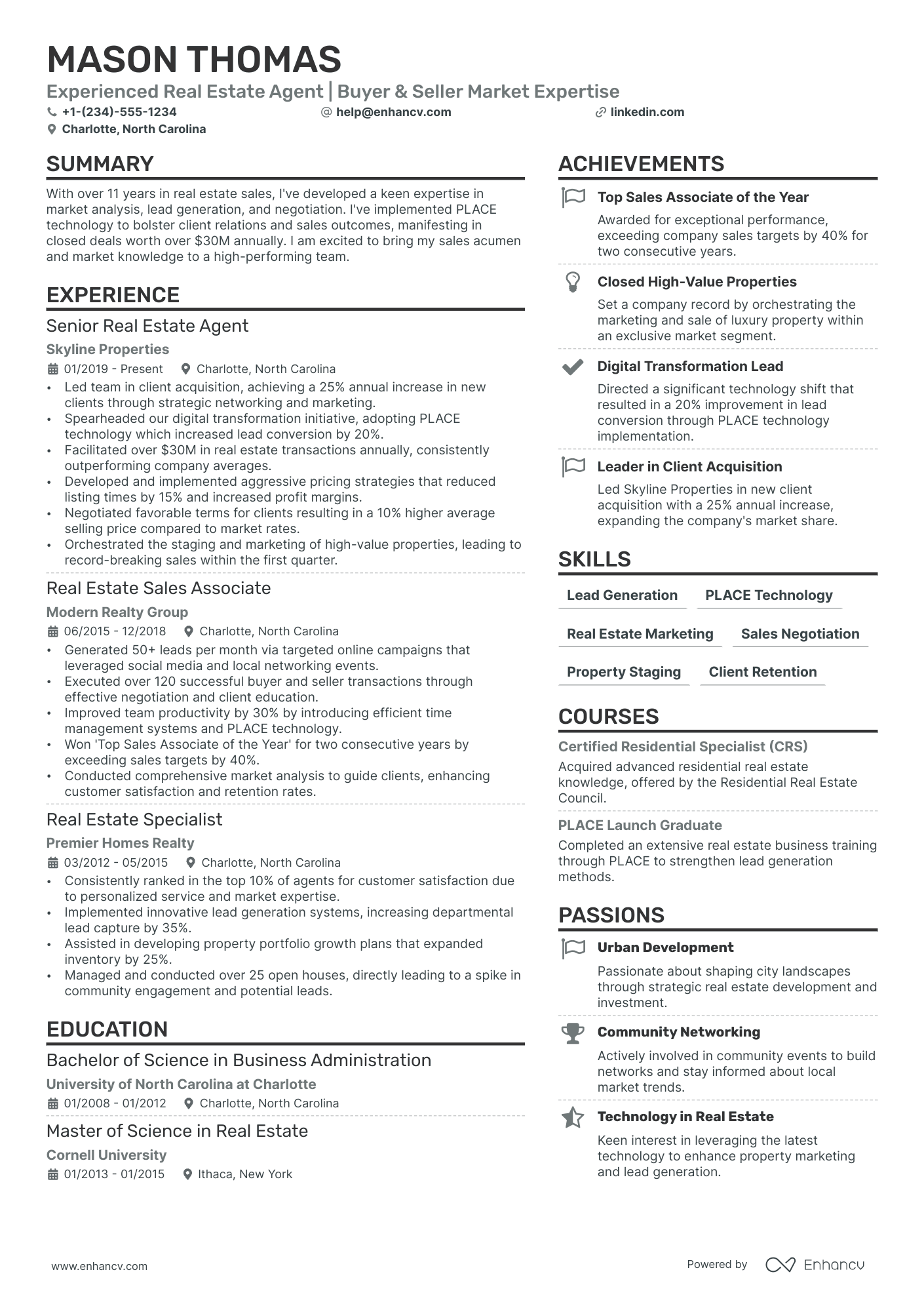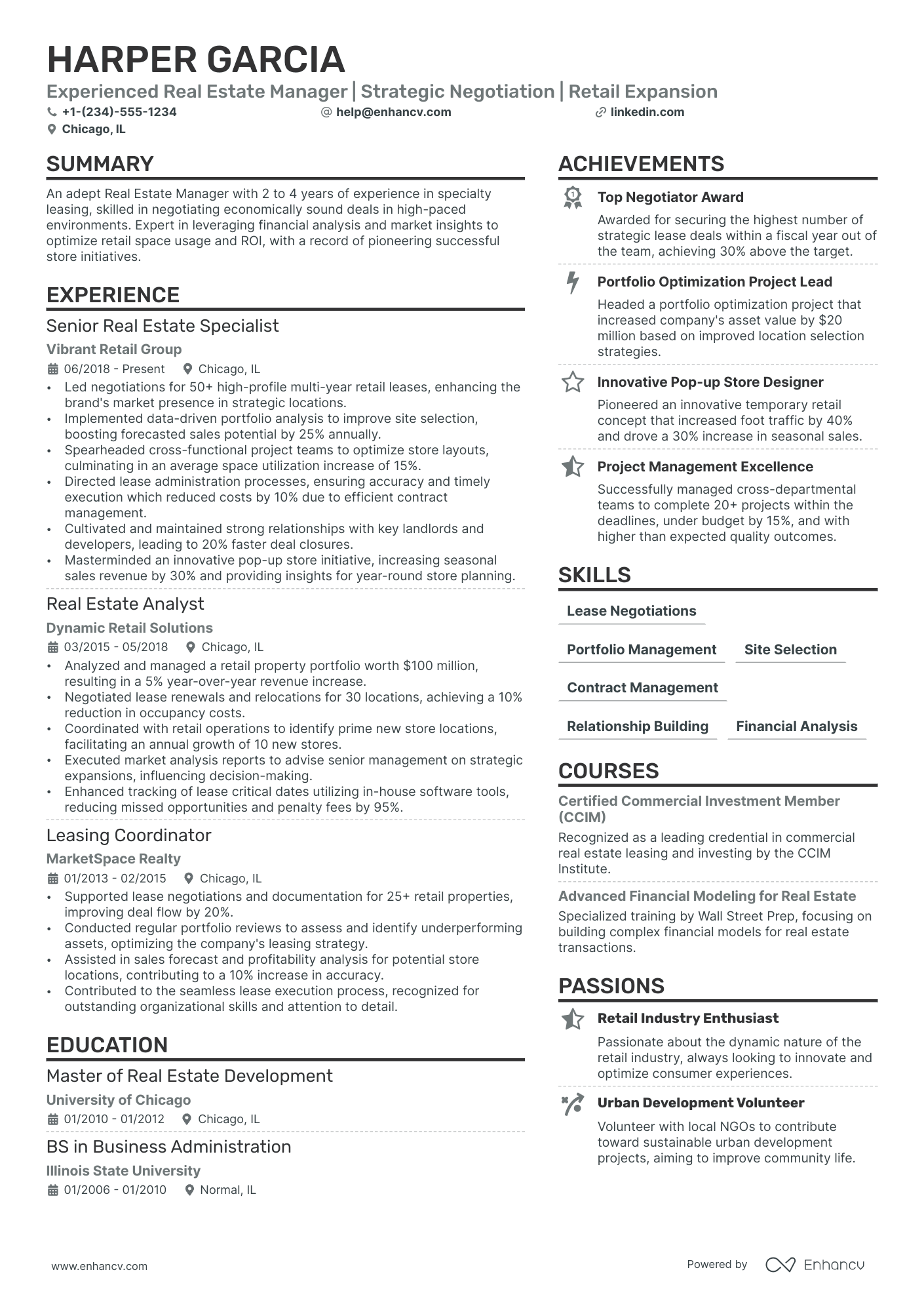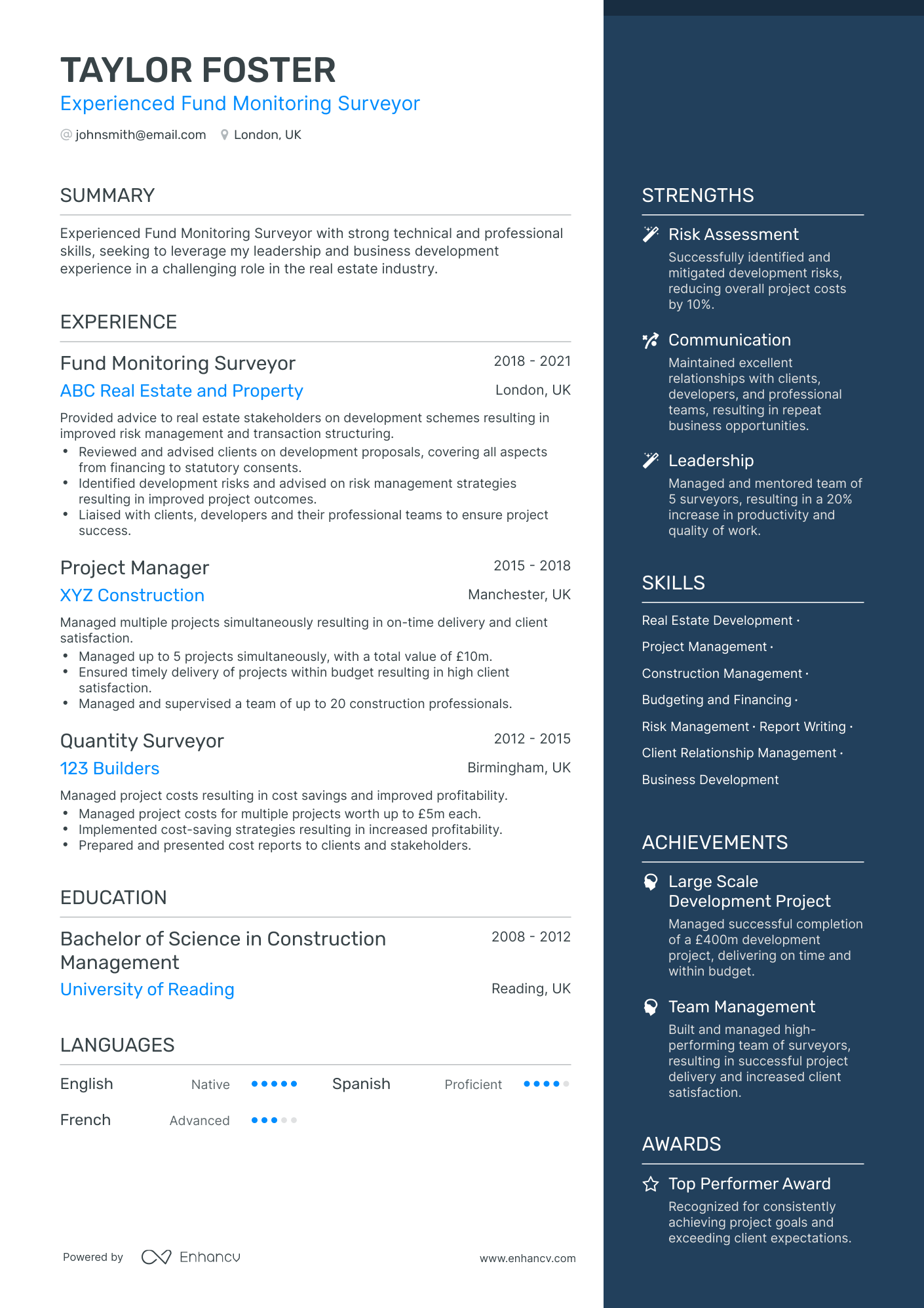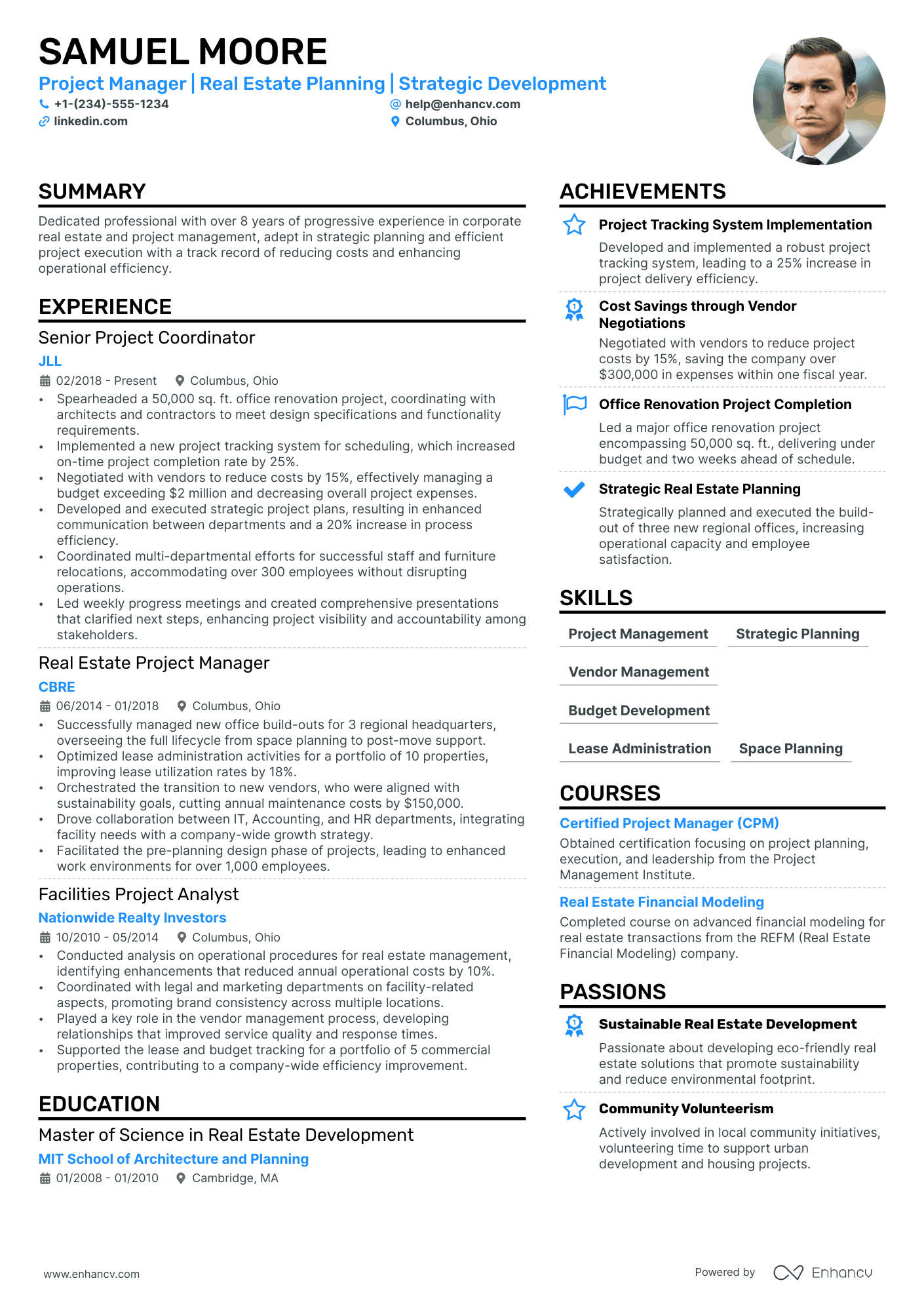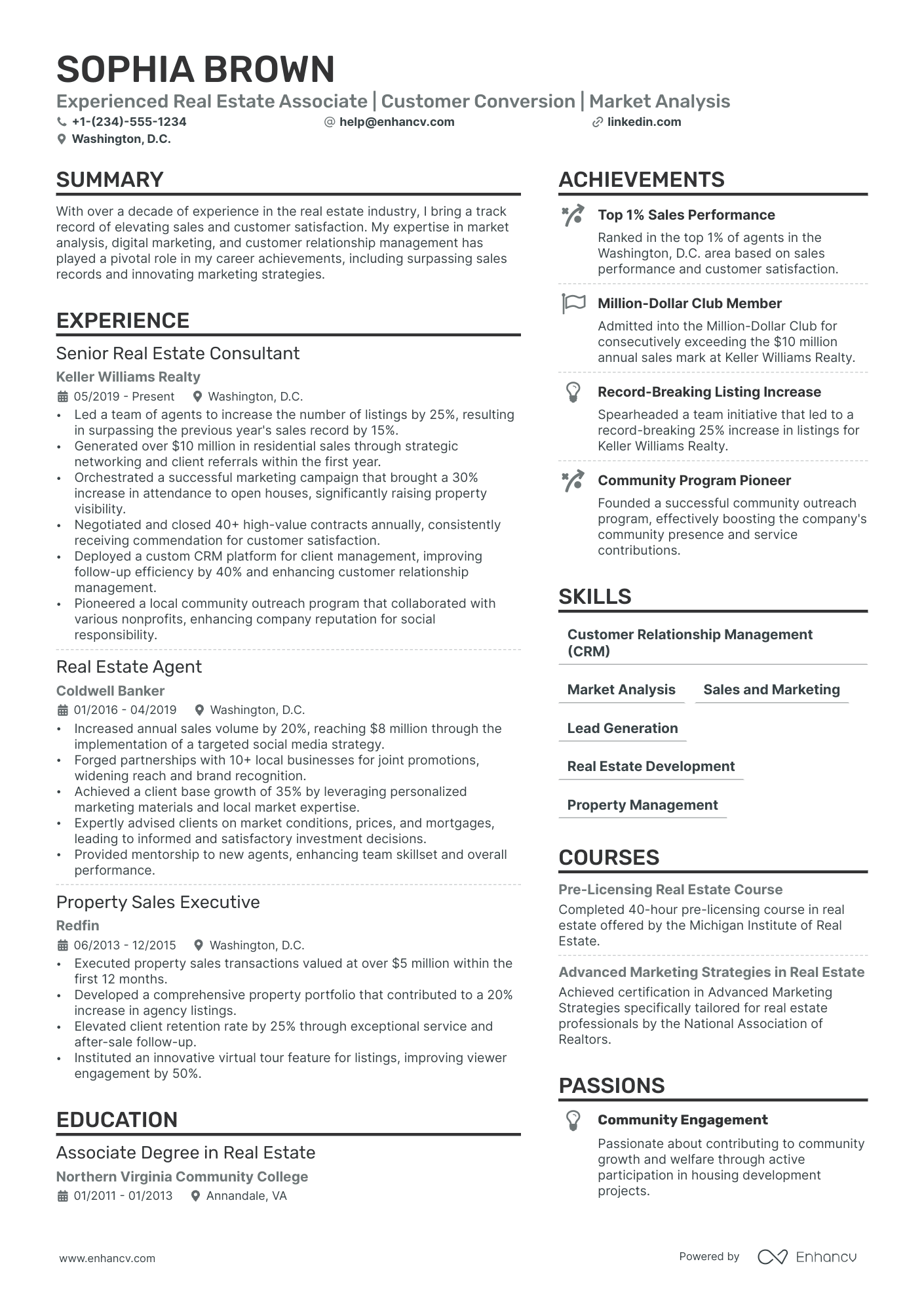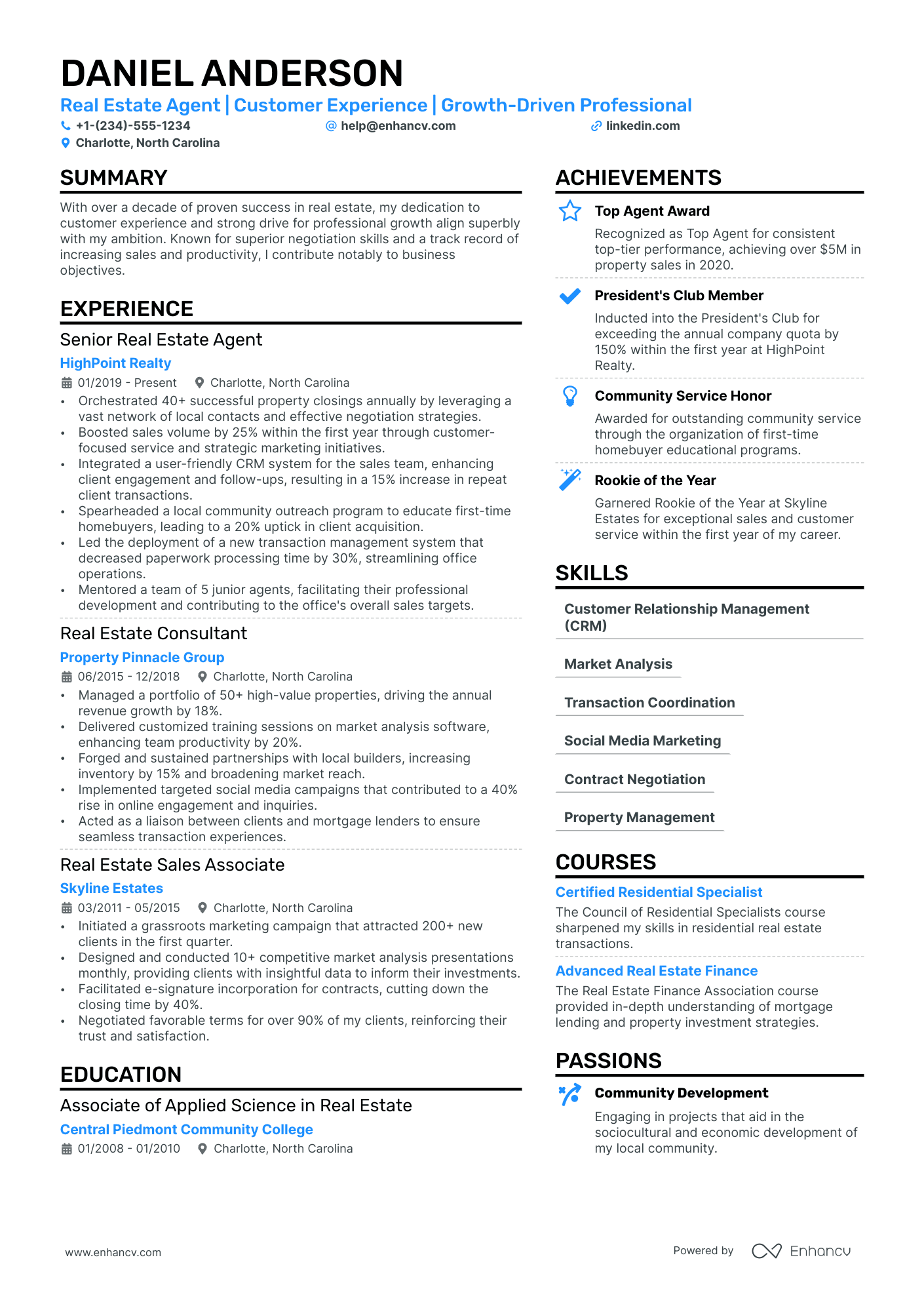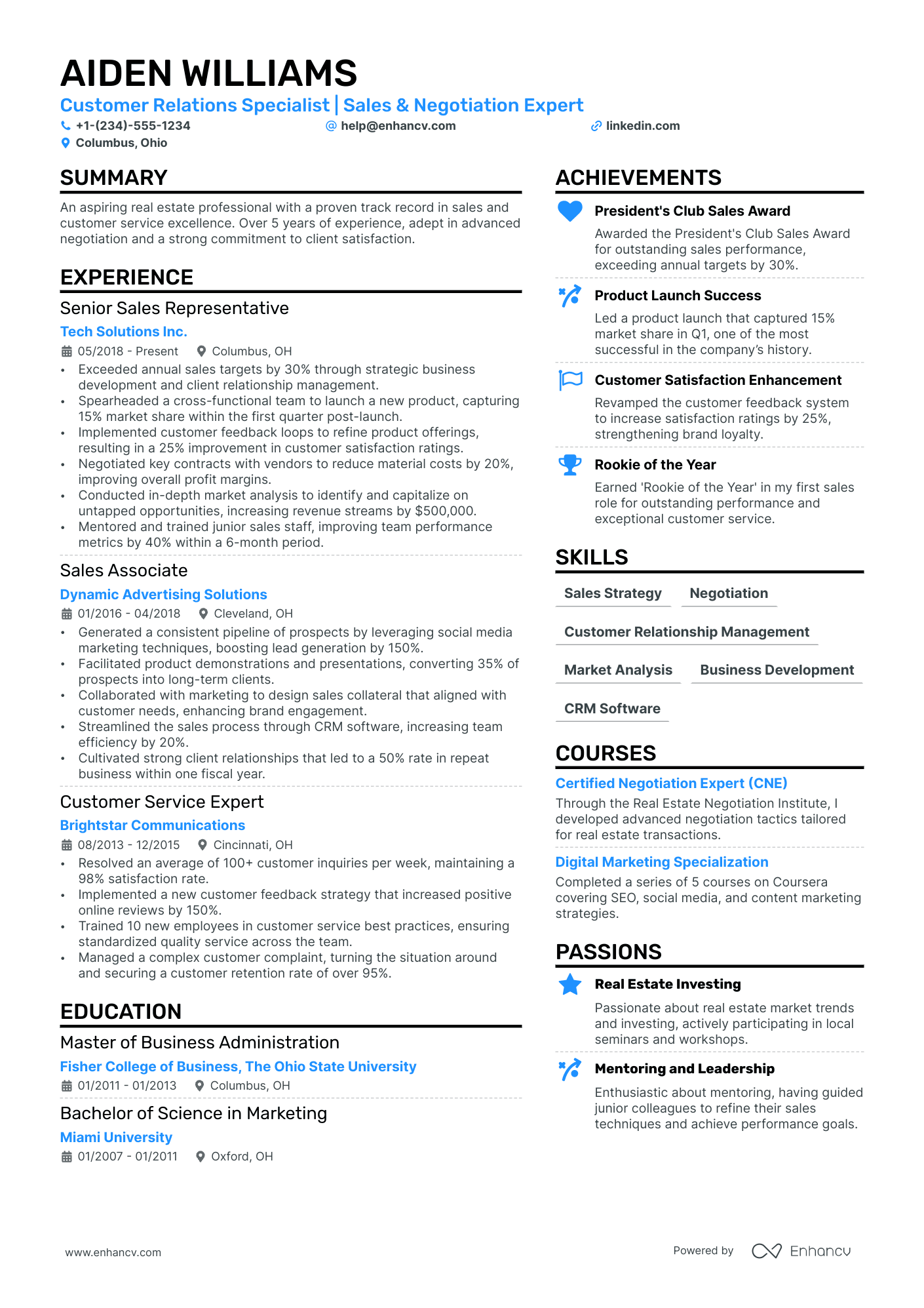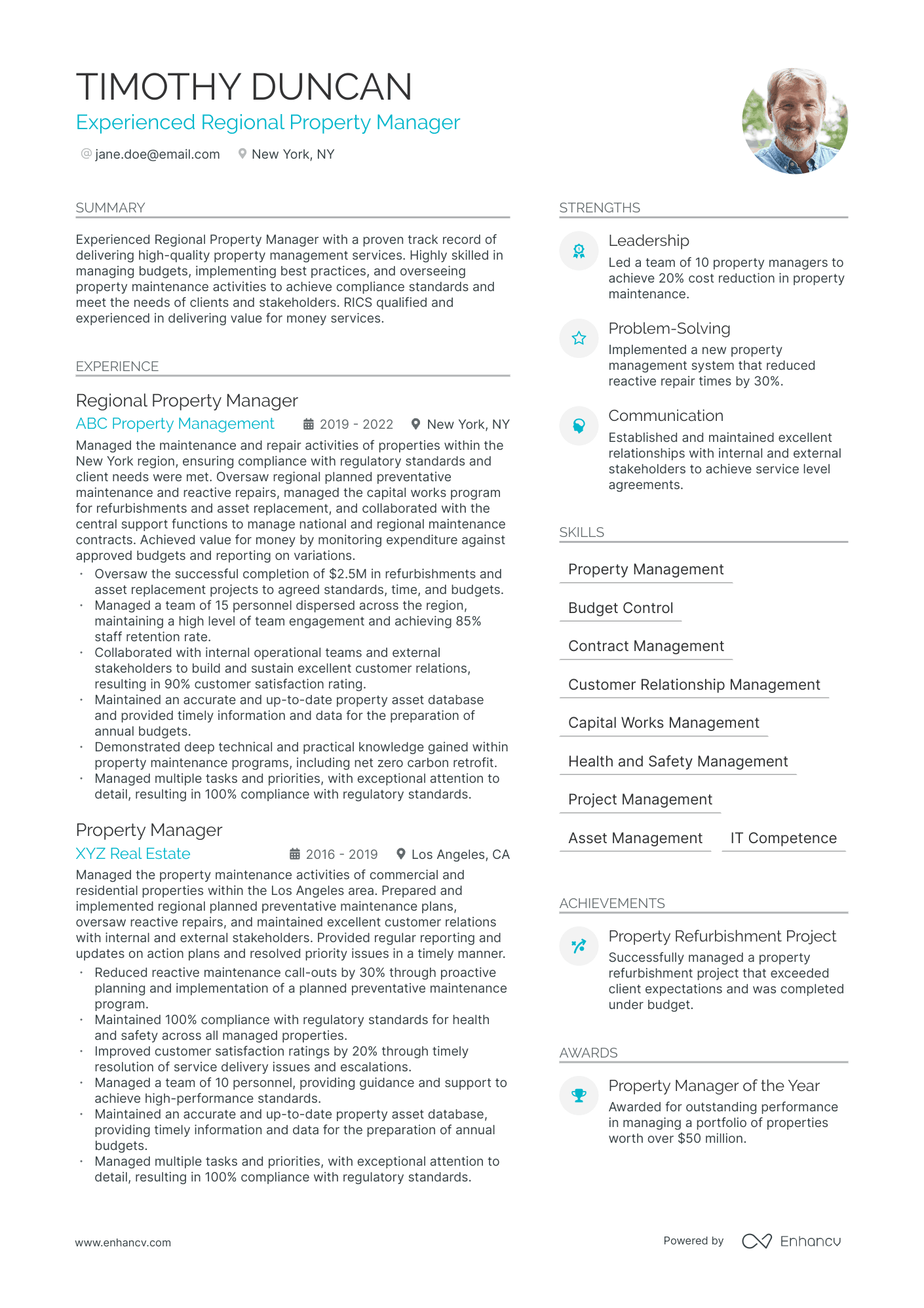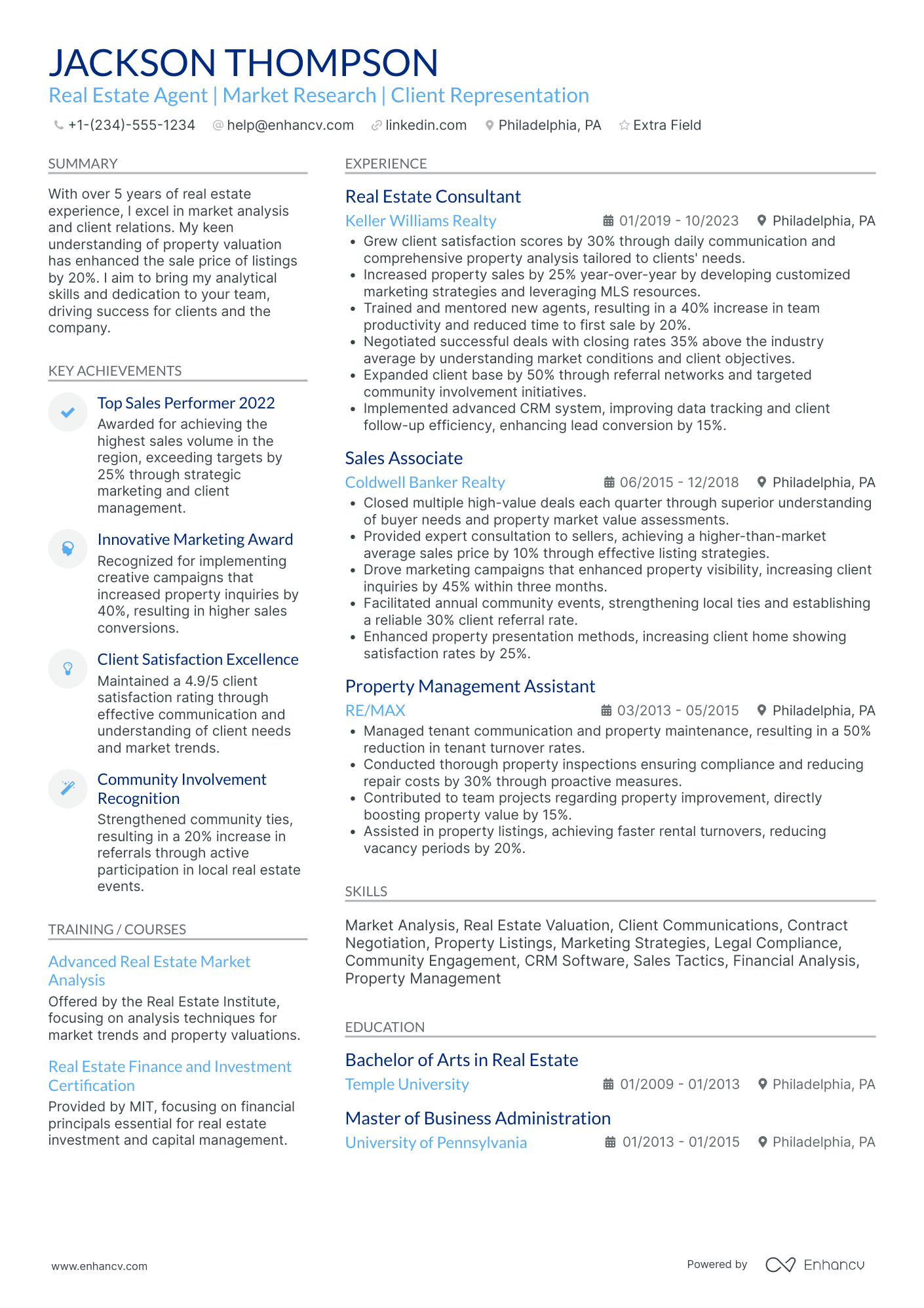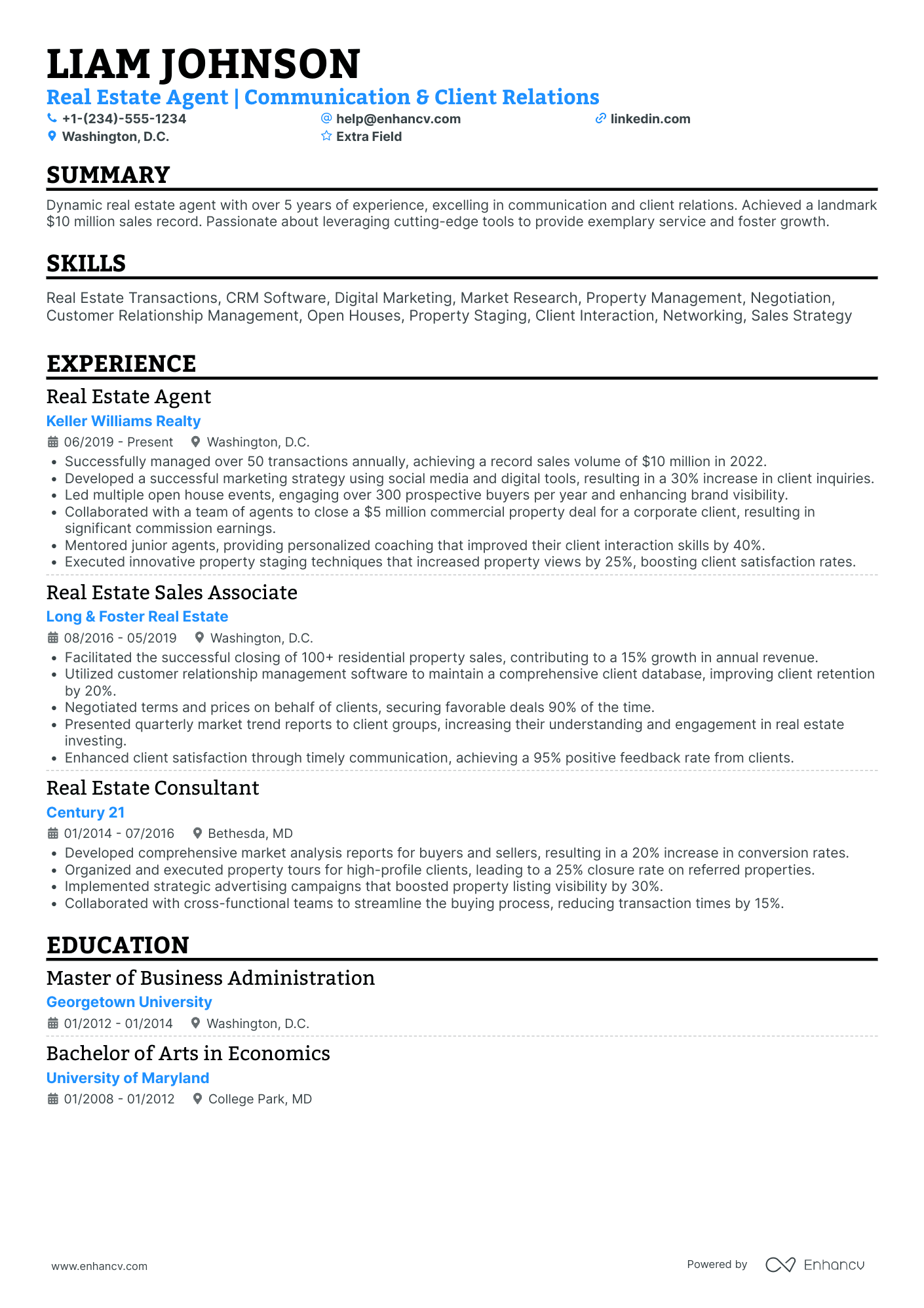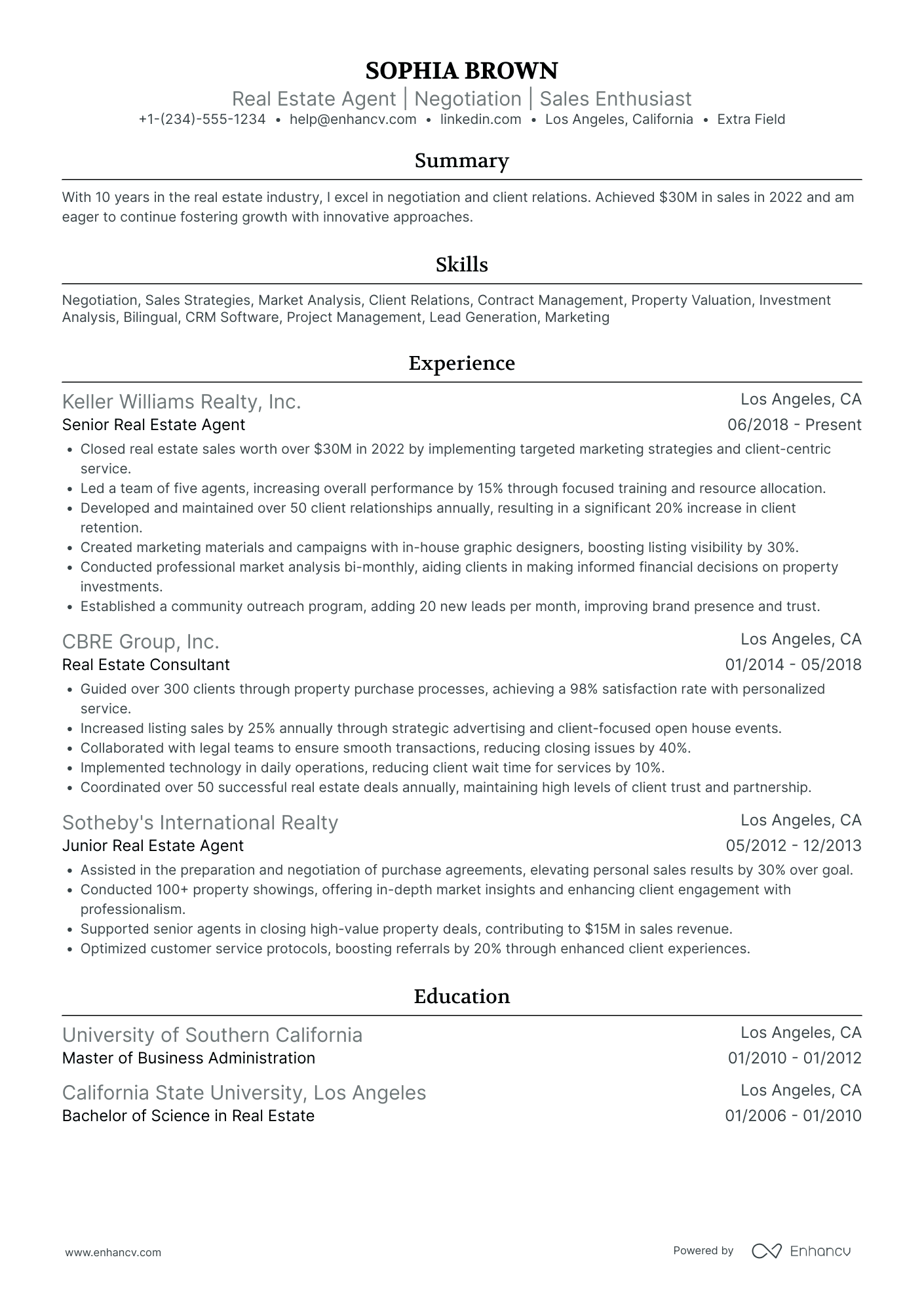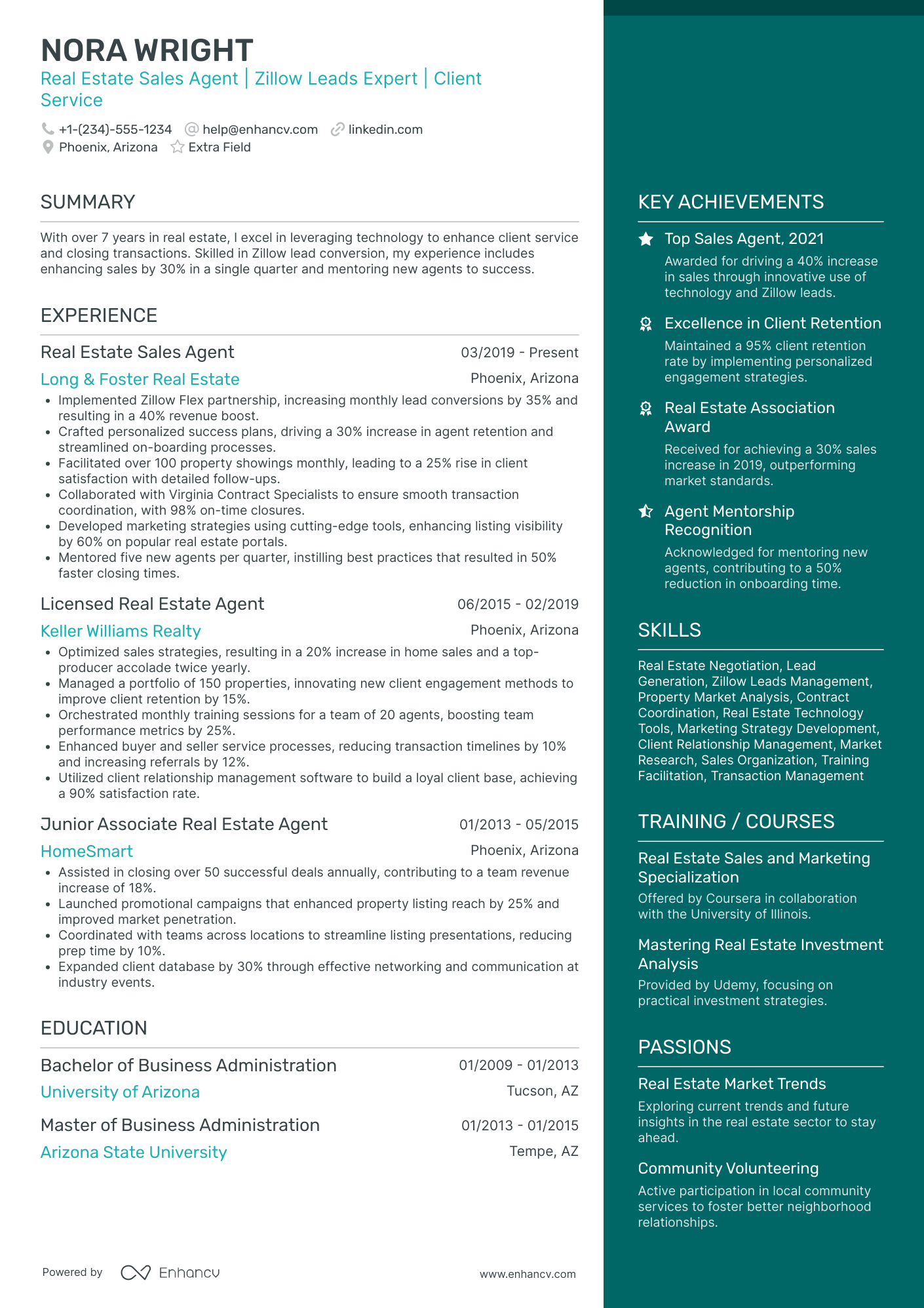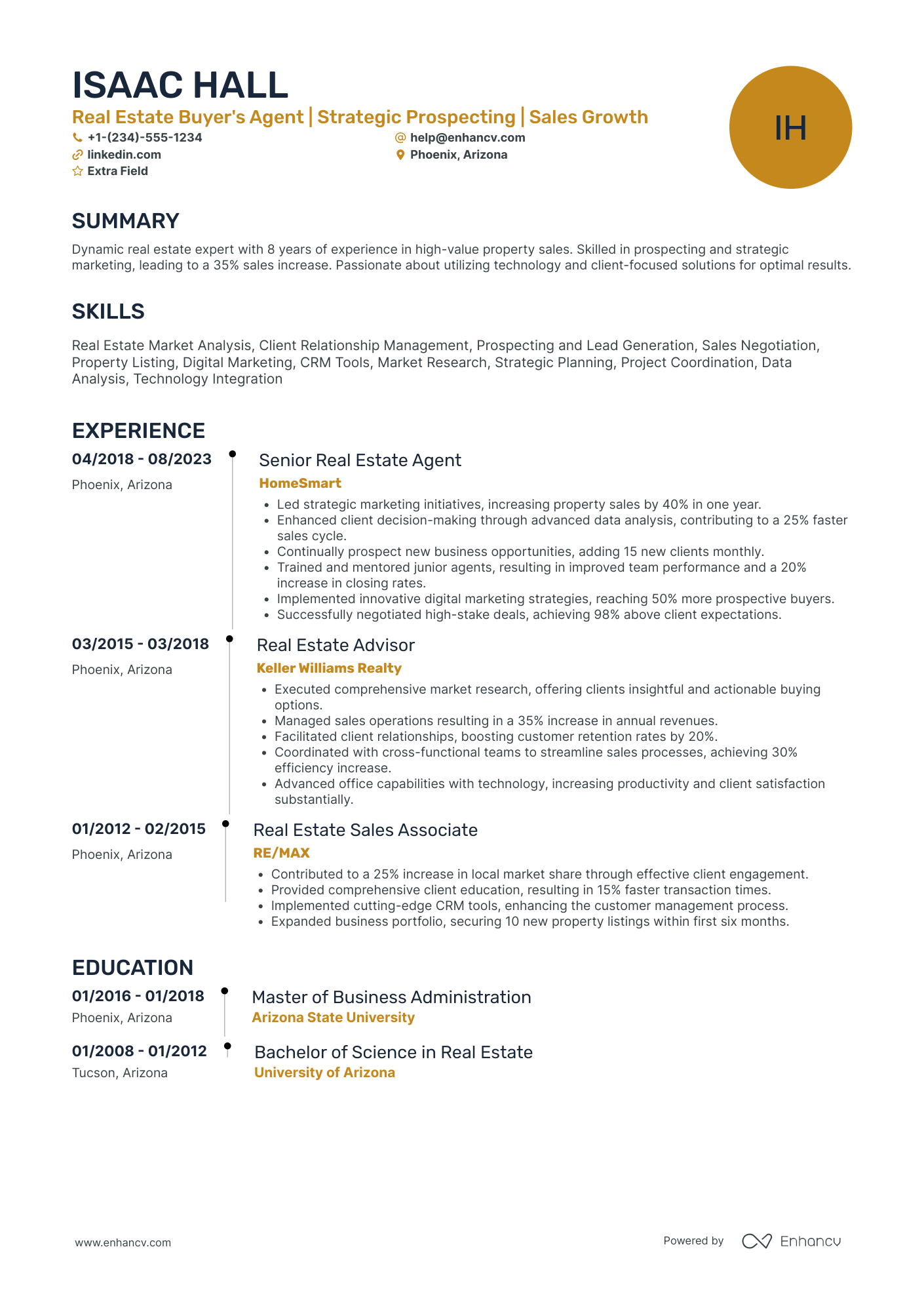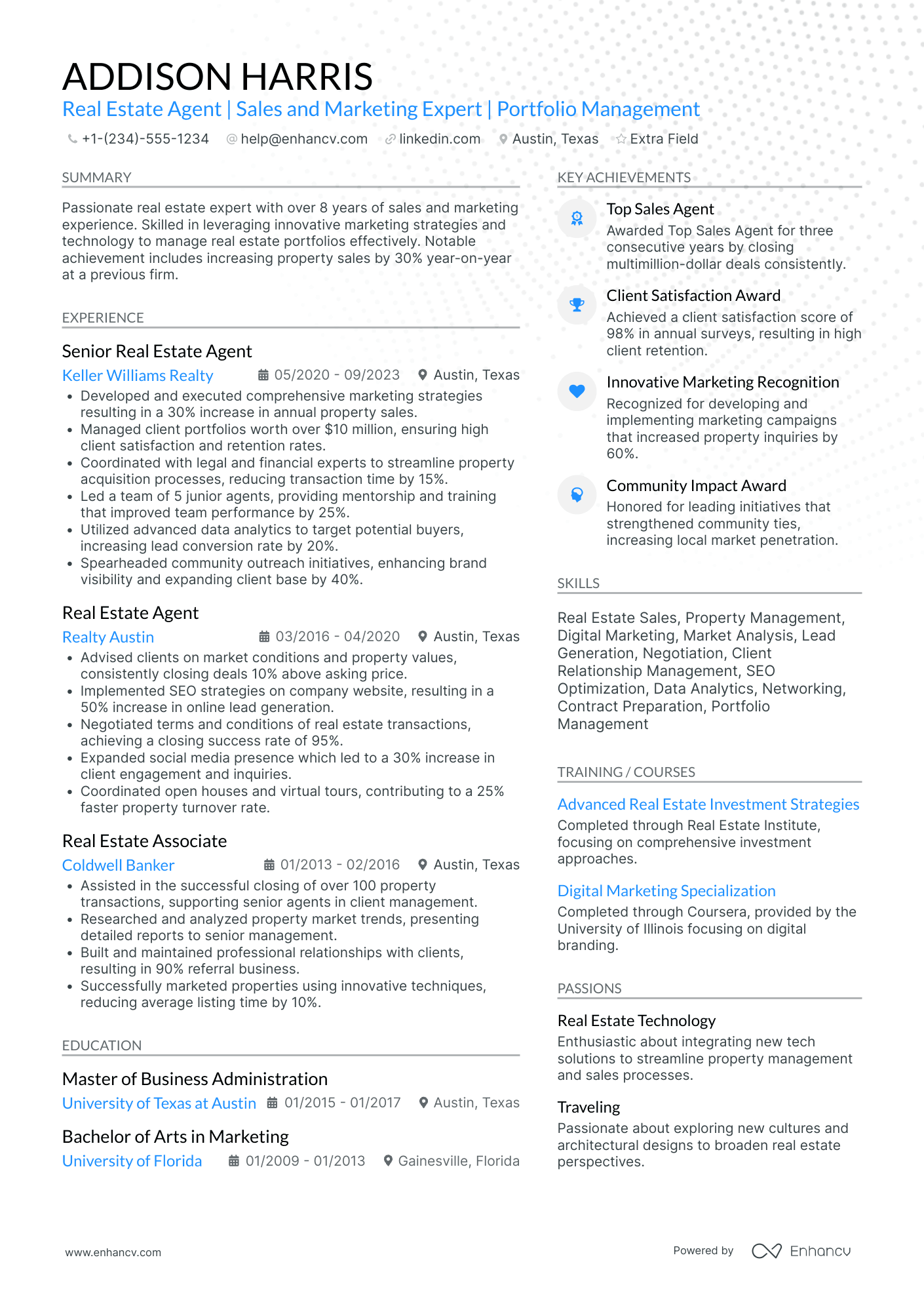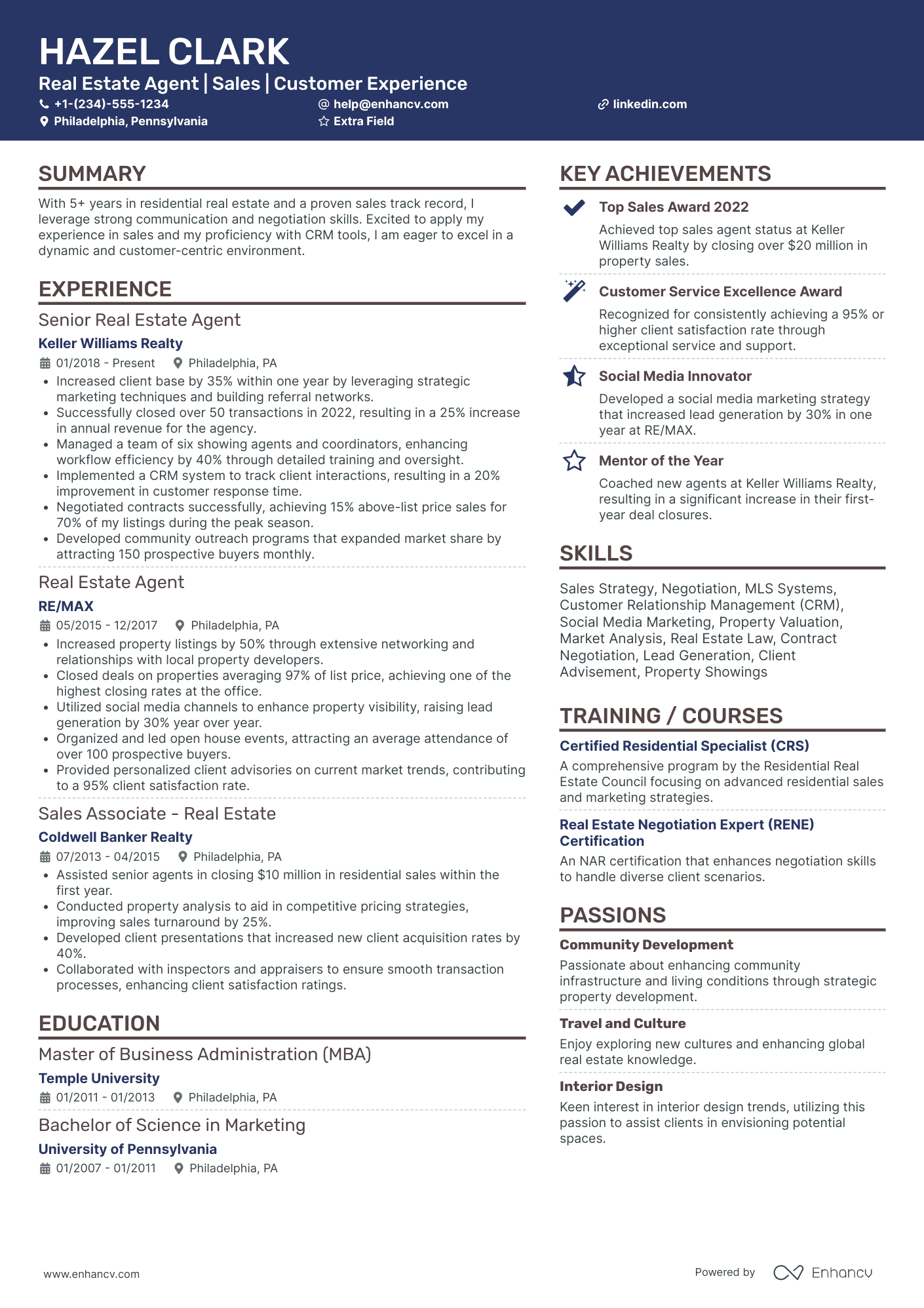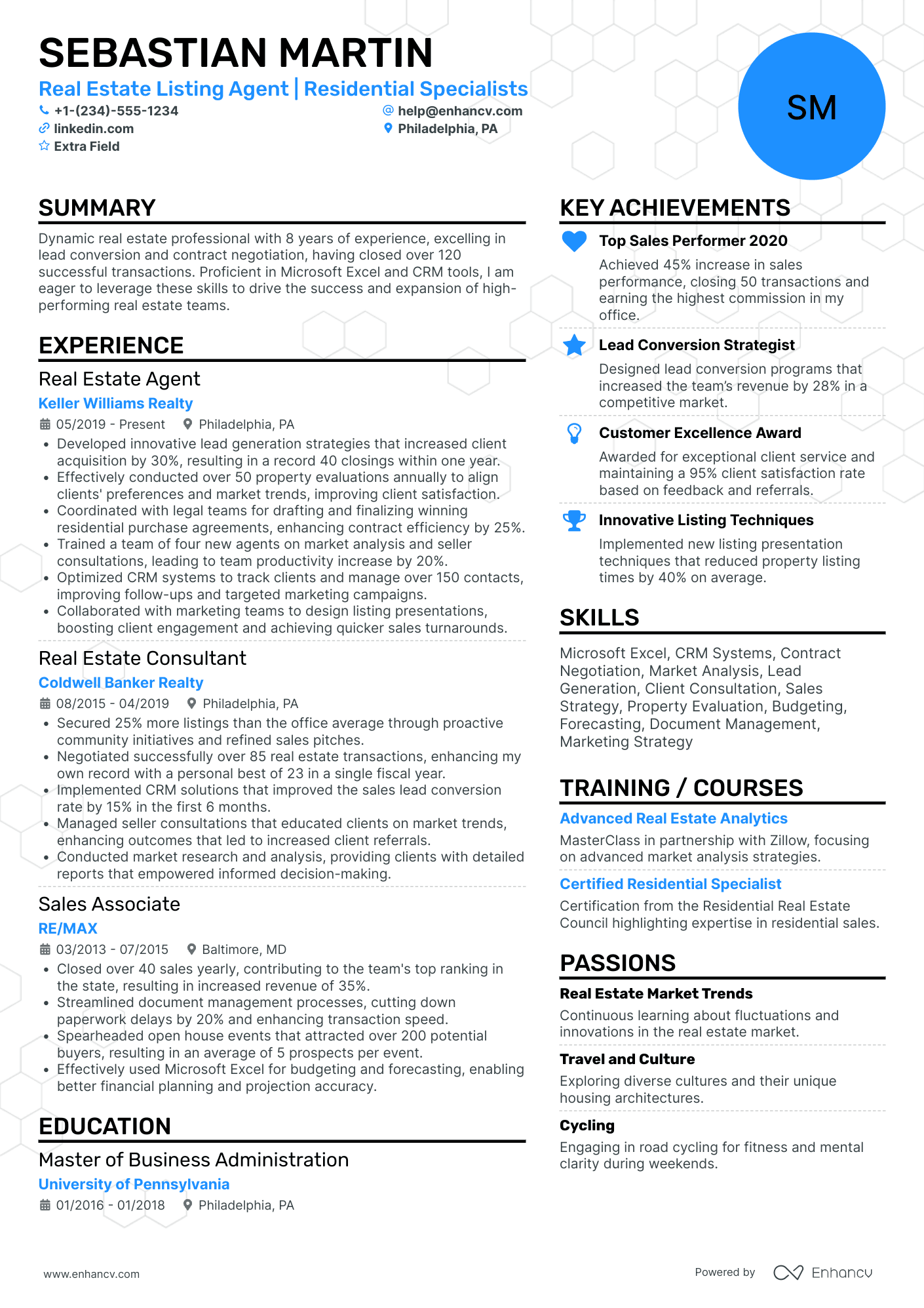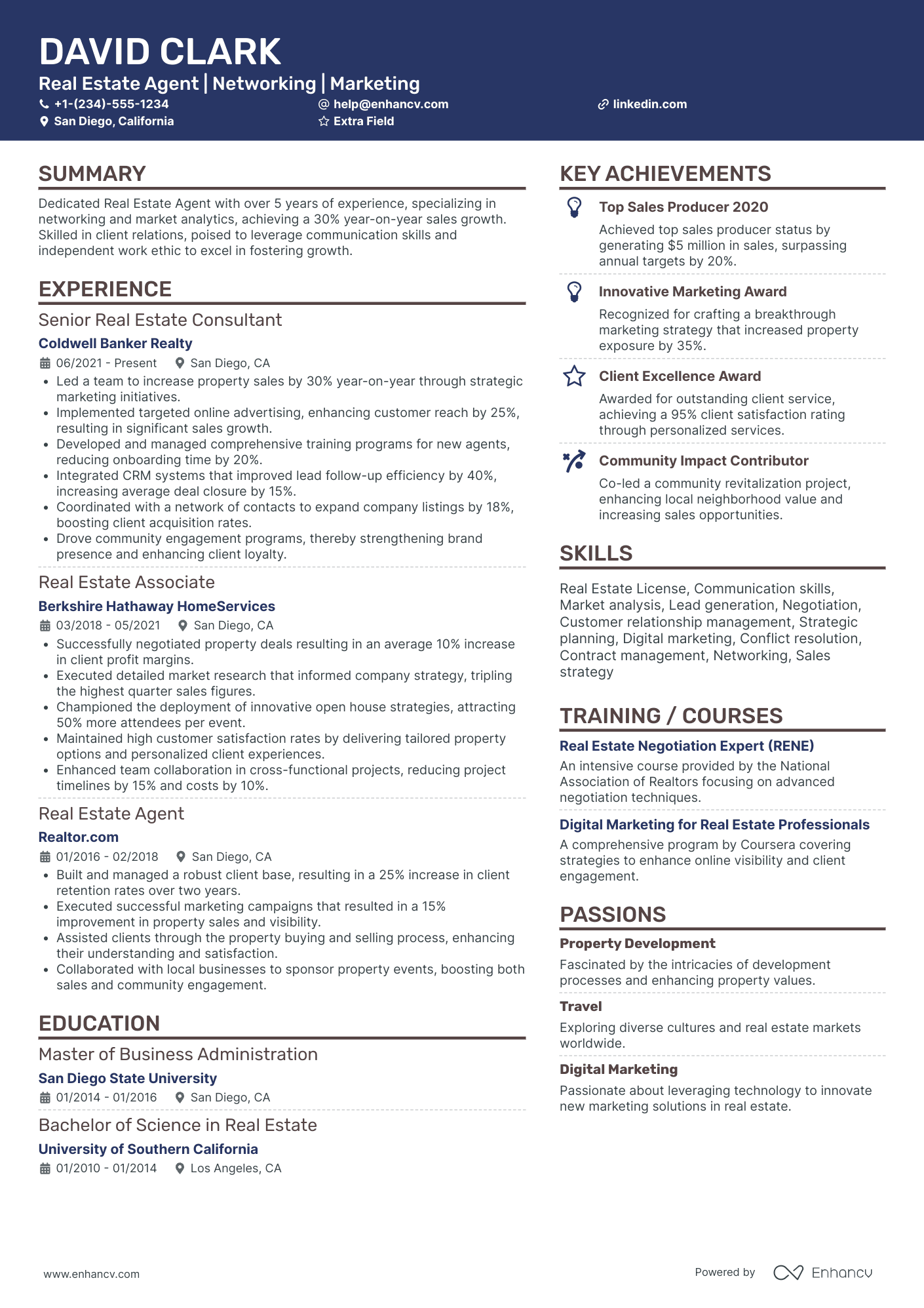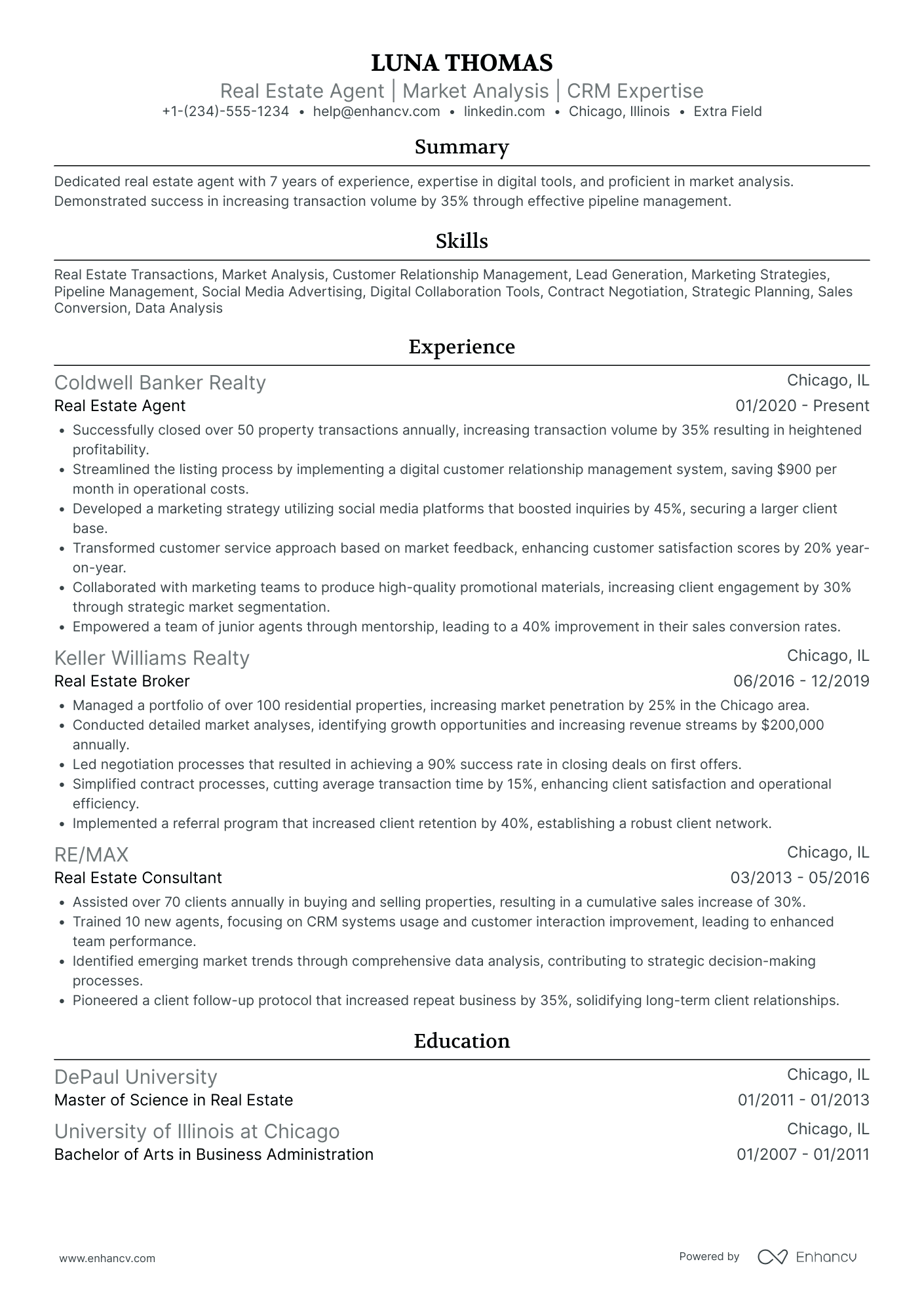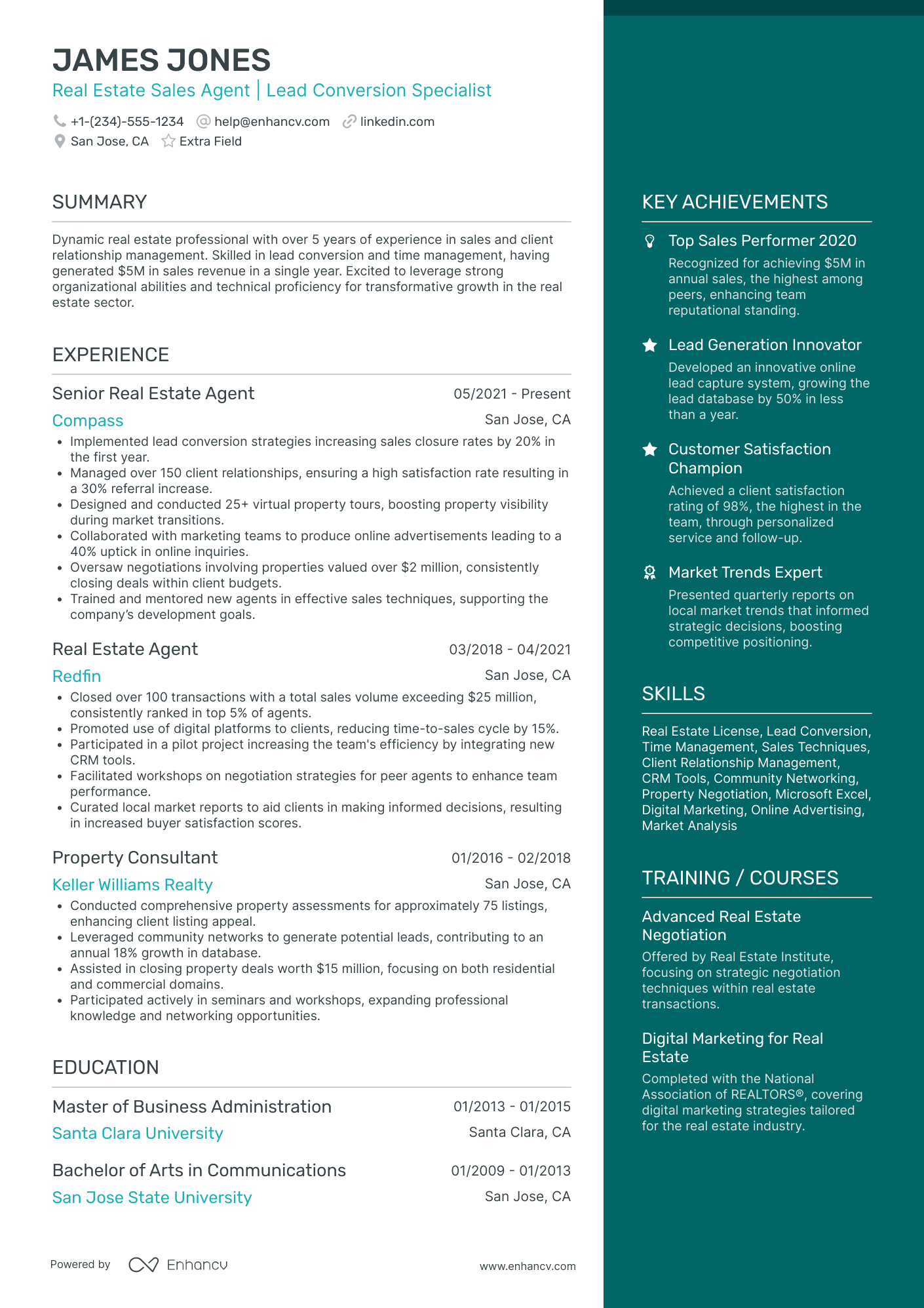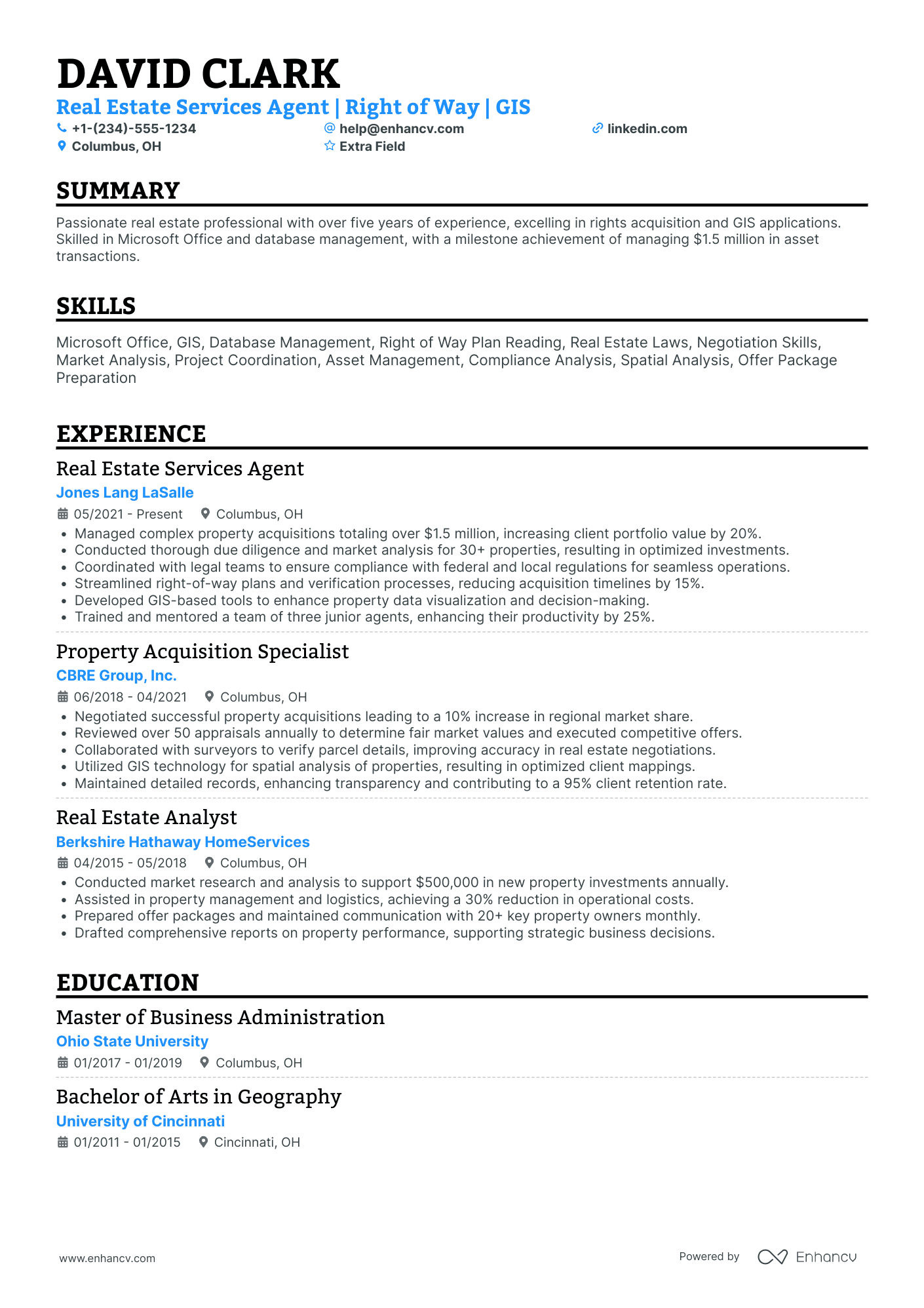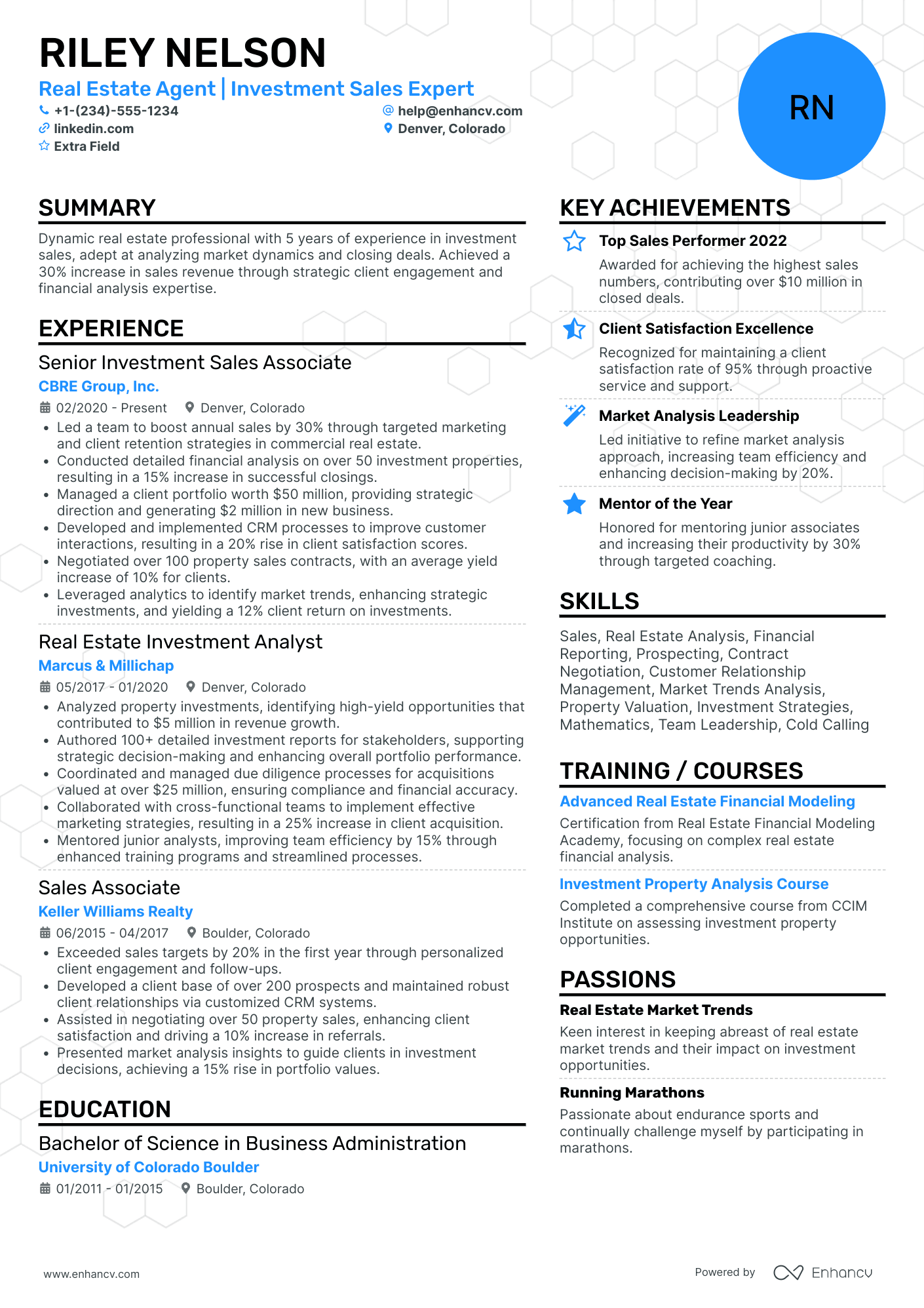Stepping into the real estate industry means embracing a profession filled with possibilities and obstacles. On the bright side, you have the potential for high earnings through commissions, flexible work hours, and diverse daily tasks. However, it's not without its hurdles. You'll face stiff competition, experience ups and downs in earnings, and depend on the real estate market's fluctuations. Plus, there's a lot of legal paperwork to get a handle on. But let's keep it real —if you have the idea of "I can get rich quick doing this" you’re far from the truth.
Nevertheless, if you want to make your mark in this career, you’ll need an awesome real estate agent resume. Listing achievements isn’t enough. Every section of your resume needs to show how hard you work and how committed you are.
We'll guide you in building a resume that catches people's attention and sets you up for your next career step. This real estate agent resume guide will cover:
- Which resume format is preferable for a real estate resume;
- How to frame your resume even with little to no work experience;
- What information hiring managers are on the lookout for;
- How to balance hard and soft skills on your resume;
- Tips for highlighting your license and certifications on your resume.
Before we get started, you might be looking for something more tailored to your field. Explore our selection of real estate-focused resume guides here:
- Realtor Resume
- Real Estate Appraiser Resume
- Real Estate Assistant Resume
- Broker Resume
- Real Estate Broker Resume
- Real estate agent Cover Letter
How to format a real estate agent resume
If you're an established real estate agent, adopting the reverse-chronological resume format can highlight your career development and key successes across different agencies or real estate projects.
For those new to real estate, considering a functional resume format or a hybrid version can be beneficial. These resume formats focus on your abilities rather than past job roles and illustrate your potential in the real estate industry.
Moreover, selecting an appealing resume layout is crucial to distinguish yourself from the competition which is vital because as we already know, the real estate sector is heavily saturated.
Here are some specific resume tips:
- Pick a simple, modern resume template that fits your taste. Use a two-column layout so it can include lots of information and is easy to read.
- Stick to easily readable fonts that won't confuse Applicant Tracking Systems (ATS), like Rubik, Lato, or Montserrat, in a 10-12 pt size.
- Keep 1-inch margins throughout your resume for better aesthetics.
- Tailoring your resume to fit into one page is often the most effective approach instead of having it overflow into two pages.
- Create a header with your name and title, contact number, email, and LinkedIn profile link.
- Always save your resume as a PDF to maintain its format across all devices and platforms.
Customize your resume for the market – a Canadian format, for example, might vary in structure.
Before deciding to include a photo in your resume, think about whether it corresponds with the job and company culture.
If your real estate agent resume could use a boost, consider using our free AI resume checker. It conducts 16 crucial checks to prepare your resume and enhance your chances of landing interviews.
Is your resume good enough?
Drop your resume here or choose a file. PDF & DOCX only. Max 2MB file size.
Ensure your resume's main sections are tailored to impress recruiters in the real estate industry.
The top sections on a real estate agent resume:
- Include your contact information to enable recruiters to reach out for further discussion or interviews easily.
- Use the Summary or Objective section to provide a concise overview of your career path and intentions.
- Outline your career history in the work experience section and emphasize responsibilities and achievements in previous positions relevant to a real estate agent's duties.
- Underline both hard and soft skills important for real estate, such as knowledge of real estate laws, negotiation abilities, and customer service expertise.
- The licenses and certifications are critical, as being a licensed real estate agent is a requirement in most states, demonstrating your eligibility for the role.
The structure of your resume should align with the expectations for a real estate agent role. Besides that, investigate the job posting to recognize the necessary skills and keywords to include in your resume.
What recruiters want to see on your resume:
- Licensing: Recruiters prioritize licensed real estate agents as it's a legal requirement to carry out transactions.
- Experience in real estate: Recruiters value this to be assured that the candidate is familiar with the industry and the job's unique challenges.
- Local market knowledge: This is prioritized because understanding the local market is vital for pricing strategies, marketing, and negotiations.
- Network and connections: Recruiters find this important as networking is a key aspect in the real estate business because it leads to quicker property listings and sales.
- Negotiation skills: This is a priority for recruiters as real estate agents need to negotiate deals effectively to ensure client satisfaction and maximize earnings.
The experience section is crucial for real estate agents. Here, you list your past jobs to show you're experienced and a good fit for a real estate position.
How to write your real estate agent resume experience
For real estate agents with more than three years of experience, having a strong base of previous clients and a full schedule of showings and upcoming closings is common. The advantage of building long-lasting relationships is clear. Clients from 4-5 years ago often return, looking to buy or sell again, making them more likely to choose you for their real estate needs.
Working with first-time buyers can be tough, but it's a crucial part of the job. To make your resume stand out for a real estate agent position, make sure the experience section clearly matches what the employer is looking for, as outlined in the job description. Include specific skills from the job listing and back them up with measurable outcomes and successes.
To understand how to present your experience, let's check out two real estate agent examples..
- •Handled real estate transactions.
- •Organized virtual home showings.
- •Increased commercial property purchases.
- •Involved in deal negotiations.
What’s wrong with it?
- There isn't information on how the applicant contributed to the transactions or how their actions led to positive outcomes.
- Lack of quantifiable results such as the percentage increase in property purchases or the number of transactions handled.
- The mention of organizing virtual home showings doesn't explain how it benefited clients.
- The statement doesn't illustrate the agent's skill or success in negotiations.
Let’s spruce it up a bit:
- •Closed an average of 17 deals per annum at a 98.3% customer satisfaction rate.
- •Achieved a 39% boost in home property showings visits after implementing a virtual tour option of each listed property on the company website.
- •Boosted customer trust in the company by 75% as a result of conducting regular market analysis and coaching staff on market trends.
- •Expertly negotiated deals, securing terms that benefited our clients and resulted in a 30% increase in client retention rate.
Now we’re talking. Notice how they reference metrics that would be of interest to the employer. Having measurable results isn't just some extra information to include for the hiring managers. These crucial stats can significantly improve your chances because employers care about customer generation and satisfaction rates.
How to quantify impact on your resume
Include these ideas to demonstrate your track record of success.
- Include the total sales achieved in a given period.
- Mention the average time taken to close deals.
- Indicate the range of property values you have handled.
- Write the number of listings you have managed concurrently.
- Detail the rate of customer satisfaction from surveys or reviews.
- Note down the number of signed brokerage agreements.
- Mark the ratio of exclusive seller agreements secured.
Every real estate agent, regardless of experience, can benefit from these guidelines.
How do I write a real estate agent resume with no work experience
It's common for beginners to spend a lot of time on learning and obtaining the necessary licenses without creating marketing strategies aimed at their future clients. The most important part is to know how you’re going to get your first 3 clients.
Recognizing the significance of this step is critical for setting a solid foundation for your future work.
This section provides advice on creating a resume specifically for those without actual work experience in the industry.
- Objective statement: Write a clear statement sharing your excitement for real estate, touching on your past work in the field (if any), and where you hope to go in your career. Make it easy for hiring managers to see how you fit with what they're looking for, using the job ad as a guide.
- Skills section: List your good people skills like negotiation and customer care. Share how your previous jobs have prepared you for a real estate agent job.
- Experience section: In this part of your resume, focus on work you've done that connects to real estate. Even if your previous jobs weren't in real estate, highlight tasks related to dealing with properties, sales, or customers.
- Education section: Mention your degree(s) and any specific subjects you studied that relate to real estate or business. Real estate licenses can make your application stand out as well.
How to list your hard and soft skills on your resume
Creating a skills section on a real estate agent's resume is key, as it highlights your ability to navigate the market, utilize real estate platforms, and engage with clients.
Organize your skills into two main categories: hard and soft skills.
Hard skills include knowledge of local real estate laws, proficiency in real estate CRM software, understanding market analysis tools, etc.
Soft skills, such as communication, negotiation, client service, and networking, are equally important. They show your ability to connect with clients, negotiate deals, and work collaboratively with other agents and stakeholders.
Here are some essential skills for a real estate agent's resume.
Best hard skills for your real estate agent resume
- Marketing
- Client acquisition
- Lead generation
- Market research
- Contract preparation
- Financial analysis
- Customer relationship management (CRM) software
- MLS databases
- Geographic information systems (GIS)
- Pricing strategy
- Property law
- Local zoning regulations
- Land use laws
Best soft skills for your real estate agent resume
- Negotiation
- Communication
- Active listening
- Networking
- Attention to detail
- Time management
- Persuasion
- Patience
- Customer service
- Trustworthiness
- Empathy
- Self-motivation
- Problem-solving
- Stress management
- Resilience
How to list your education and certifications on your resume
In most states, your high school graduation is the only formal education milestone you need to get your real estate license. In some states, you’re not even required to complete high school for licensure, as long as you meet the minimum age requirement.
You’re often not required to complete any post-secondary education (traditional university or tech school education) to become a licensed real estate agent. However, a handful of states do require further formal education to attain licensure.
To be eligible to become a licensed real estate salesperson or agent, you must:
- Be at least 18 or 19 years old (depending on the state)
- Have legal US residency
- Complete your required pre-license education
- Pass your state real estate license examination
Each state’s real estate licensing requirements are different. Find a list of state-specific steps to become a real estate agent here.
If you have a high-school diploma the following example will show you how to position it correctly on your resume.
For university students aiming for a career in real estate, consider expanding your education section on your resume like this:
On your real estate agent’s resume, mention when you expect to graduate and your GPA if it's over 3.5. This shows off your academic achievements.
PRO TIP
If you have both a major and a minor, ensure that the education section of your resume lists your major first, followed by your minor.
Besides your high school diploma and bachelor's degree, you need to show your license as well. Here’s an example:
Recruiters in the real estate industry value agents who are dedicated to both personal and professional development in this competitive field. A focus on your resume should be your real estate licensing, already highlighted in the education section. This, along with additional certifications and designations, demonstrates your proactive approach to adapting to the industry's needs. Highlighting these credentials signals to potential employers your readiness to excel in the real estate market.
Designations and certifications for your real estate agent resume
After you've listed your experience and certifications, go back to the start of your resume to polish your summary. Here, you'll pack your biggest strengths and wins into a short, sharp section of no more than five sentences.
How to write your real estate agent resume summary or objective
Creating a compelling resume summary or objective for a real estate agent position means highlighting your skills, experience, and value clearly and briefly. Approach each option as follows:
Optimize your resume summary and objective for ATS
Drop your resume here or choose a file.
PDF & DOCX only. Max 2MB file size.
Resume Summary
For experienced real estate agents, a resume summary is the way to go. This should spotlight your major achievements, key skills, and how you can add value, emphasizing your history of success in real estate sales and client satisfaction.
Resume objective
A resume objective is ideal for newcomers to real estate or those shifting careers. It focuses on your ambitions, key skills, and how you aim to grow and contribute to your future employer in real estate.
Tips for crafting your summary or objective:
- Be concise: Write a sharp 3-4 sentence summary or objective that neatly encapsulates your professional background or aspirations.
- Customize: Adjust your summary or objective to the real estate role and agency you're targeting.
- Highlight achievements: Use specifics and outcomes to illustrate your success (e.g., "closed over 100 property deals").
- Focus on relevant skills: Emphasize real estate skills and knowledge, like market analysis and negotiation, particularly those listed in the job description.
A well-designed summary or objective can significantly impact your resume's first impression, making the effort to refine it well worth your time.
Additional sections for a real estate agent resume
When updating your real estate agent resume, make sure to spotlight your achievements. Beyond the standard sections also consider including:
- Awards and recognitions: List any professional achievements, awards, or honors received in the real estate sector that highlight your contributions.
- Language skills: Show your ability to communicate fluently with clients, other agents, and industry professionals.
- Passions: Share hobbies and interests related or not to real estate (e.g. interior design, traveling, fitness) to demonstrate what drives you in your career.
- References: Provide testimonials from previous clients or colleagues to vouch for your professional capabilities and personal integrity.
Key takeaways
- Ensure your resume's professional presentation by selecting a clean, modern template and saving your document as a PDF to preserve its layout.
- The experience section is your opportunity to show your achievements in the real estate field, providing specific examples and measurable results.
- Illustrate your professional achievements with statistics and data, such as sales volumes and customer satisfaction scores, to demonstrate your impact.
- Your resume should underscore both hard and soft skills appropriate to real estate, including market analysis, customer service, etc.
- Highlighting your licensure as a real estate agent alongside any supplementary certifications is crucial for underscoring your qualifications.
- List your highest educational attainment and any real estate-specific courses or training you've completed.
Real Estate Agent resume examples
By Experience
By Role
